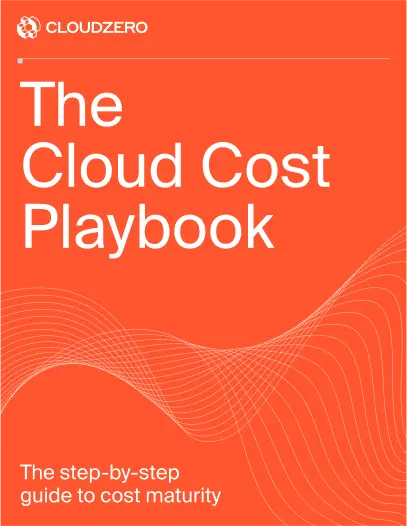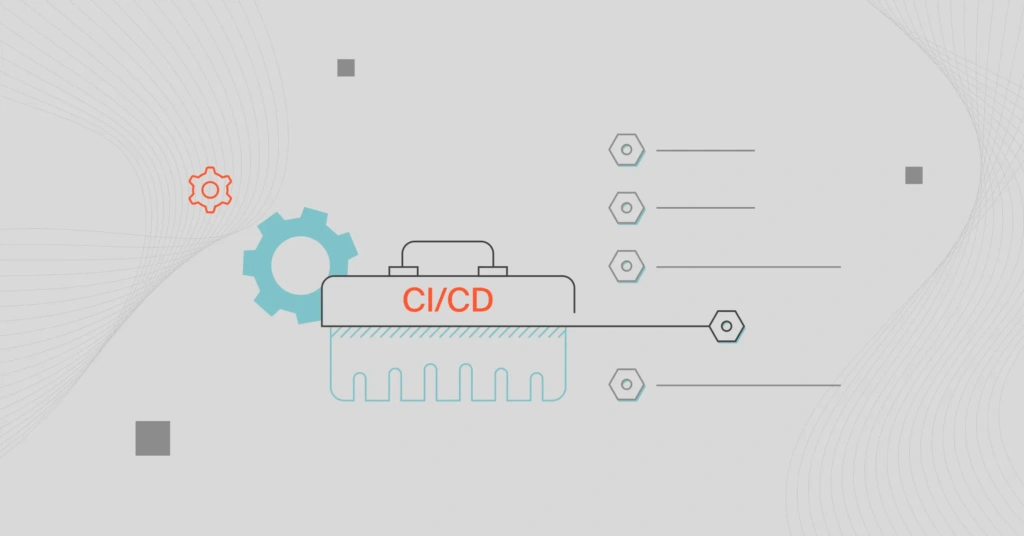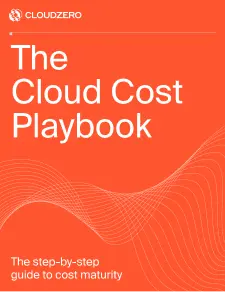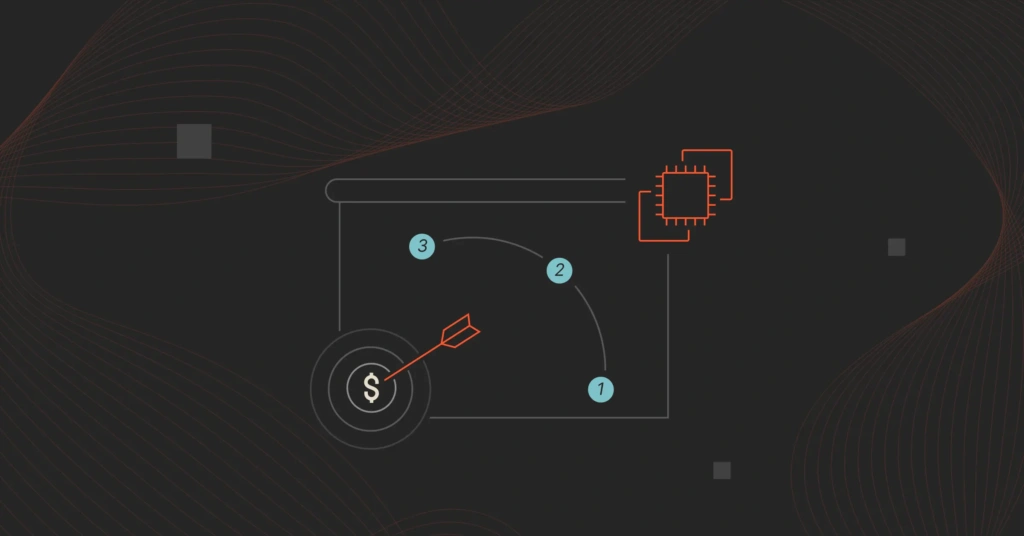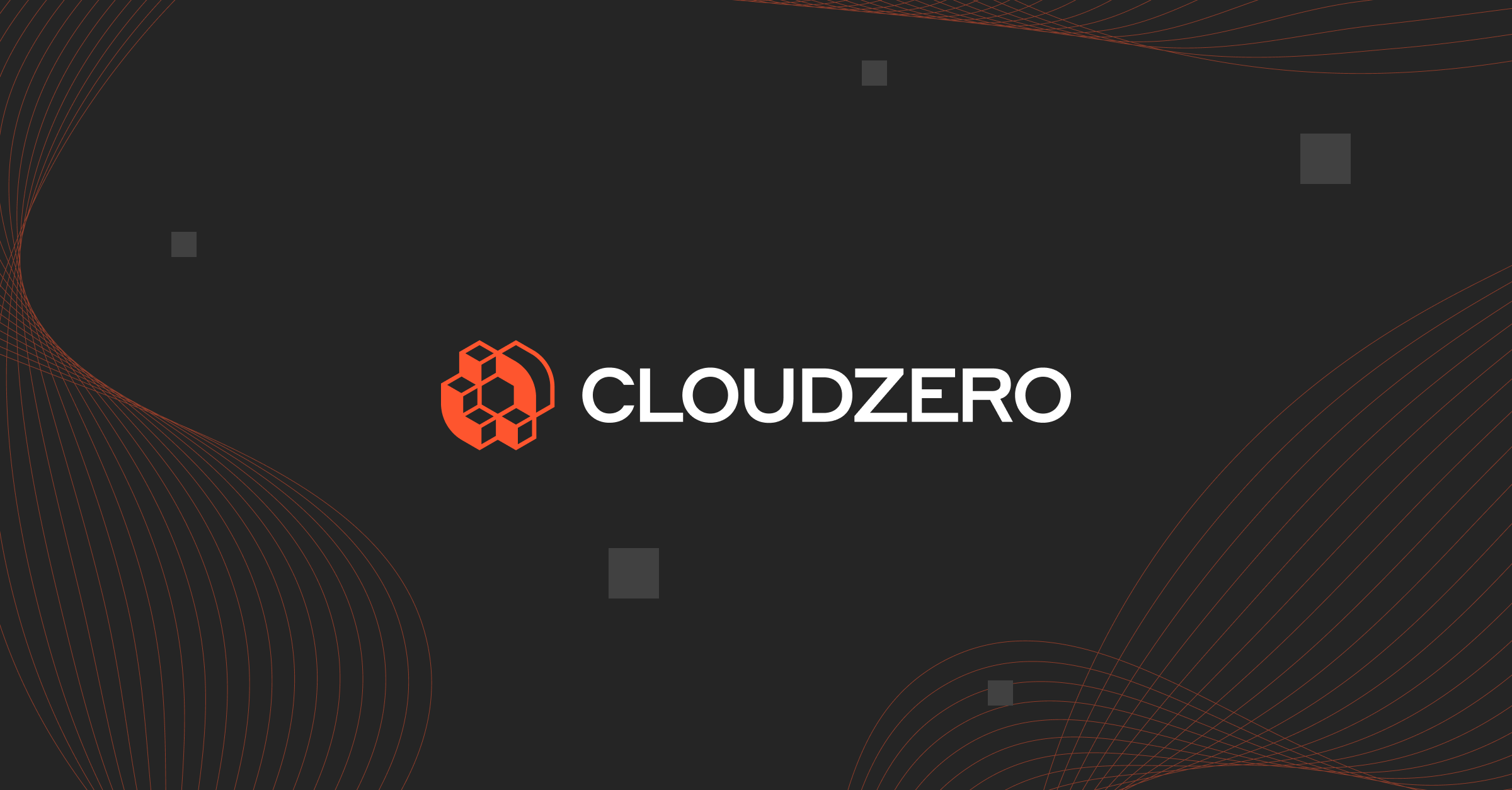The modern software development lifecycle comprises two key phases: continuous integration (CI) and continuous delivery or deployment (CD). In both stages, automation reduces manual labor, minimizing human errors.
That enables DevOps teams to focus on mission-critical work instead of continually fixing mistakes.
Automating CI/CD also provides a check and balance system for rolling back errors. Aside from ensuring optimal system performance, this also improves other areas, like security and compliance.
Yet, for that to work, your DevOps team needs the best CI/CD tools for the job. Here are more than 50 robust solutions you can choose from.
What Are CI/CD Tools?
CI/CD tools automate the continuous integration and continuous delivery/deployment phases of the software development lifecycle.
Here’s what each phase involves:
- Continuous Integration (CI) merges frequent code changes from multiple contributors into a single, shared project. This codebase is usually hosted on a shared server or repository. CI tools automate the process of building, testing, and merging code changes to a shared repository as needed.
- Continuous Delivery (CD) automates most tasks but requires software engineers to manually approve changes before they go live in production.
- Continuous Deployment (CD) emphasizes full-release automation, ensuring that code changes can be pushed from a repository to production without human intervention.
But, are CI/CD tools really necessary?
Why Are CI/CD So Important?
Some of the benefits of CI/CD tools include:
- Beat overwhelm by building, testing, deploying, and monitoring your code from a single CI/CD tool.
- Automate repetitive tasks when building, testing, deploying, and maintaining software.
- Speed up time-to-market by minimizing manual labor and risk of human error.
- Free up software engineers to focus on more creative tasks, such as inventing new features, rather than doing repetitive work.
- Configure the right environment for software or code to run at its best.
- Identify and resolve issues before they affect customers.
- Support seamless collaboration between distributed software engineers, such as creating tasks, backlogs, and keeping track of CI/CD processes.
- Test code changes to ensure that only high-quality, secure code is pushed to live environments.
- Some CI/CD tools serve as version control, knowledge management, or cost management tools.
- Continuously perform all the above without human intervention.
So, which tools are best for what aspect of the CI/CD pipeline?
End-To-End CI/CD Tools
Some of these CI/CD tools can help you create and automate entire pipelines. Others are better at specific tasks. We’ve compiled a quick list of the best CI/CD tools currently available.
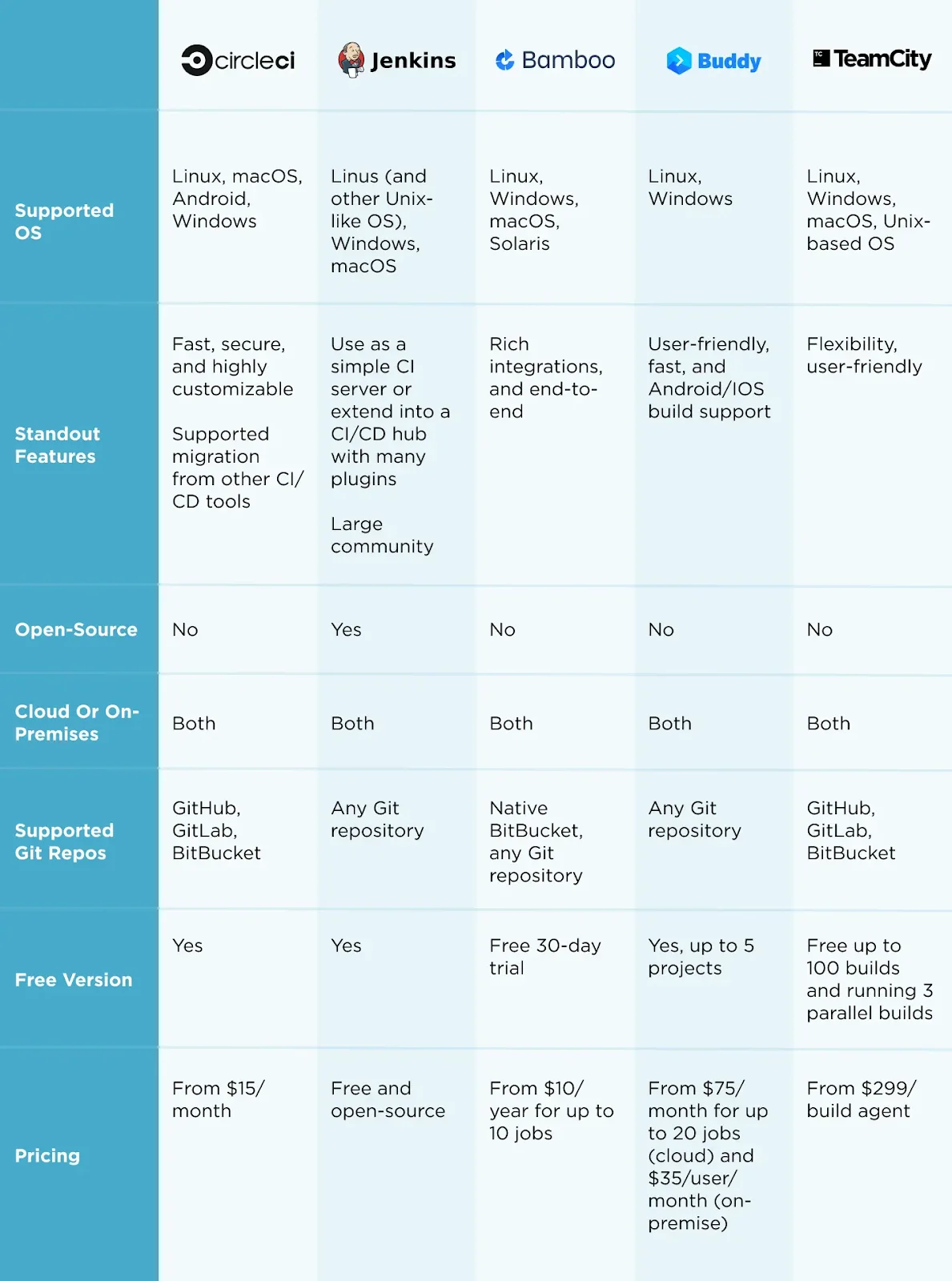
Here is a more detailed breakdown of these and other top CI/CD platforms.
1. Buddy
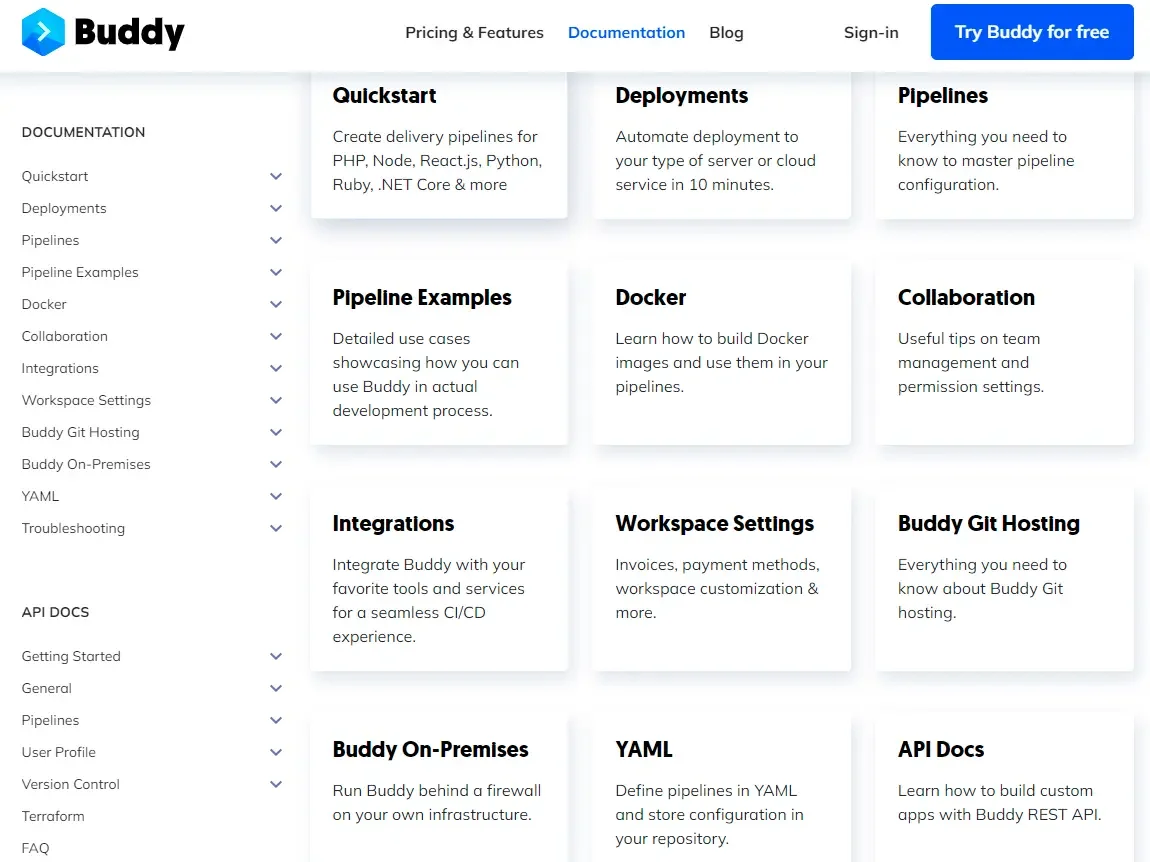
Buddy enables engineers to build and manage complex CI/CD pipelines quickly and with ease. It gives engineers direct deployment access to public repositories such as GitHub.
Buddy’s core features include file transferring, error and bug detection, change detection, project planning, alerts and notifications, and templates for team workflow collaboration and communication.
Key Buddy features include:
- 12-second deployment makes Buddy a fast CI/CD tool
- Smart change detection
- Unlimited history, plus monitor with log and real-time progress
- Advanced caching (Docker layer, artifacts, and repository)
- Reusable environments
- Encrypted and plain, fixed and settable scopes (pipeline, workspace, actions, project)
Buddy pricing: Free plan, Pro plan – $75 per month, On-premises – $35 per month per user
2. Jenkins
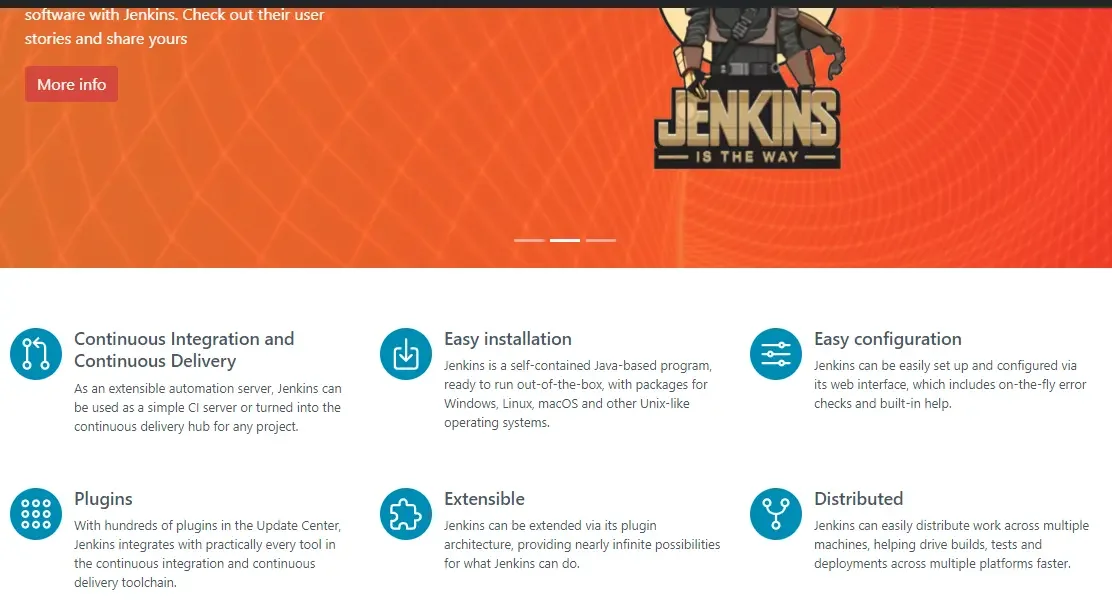
Jenkins split from Hudson (another CI tool) after a dispute with Oracle. It is a free and open-source automation server for web-based and on-premises projects. Developed in Java, it includes packages for Unix-like, Windows, and macOS operating systems. Jenkins is also popular because it works with hundreds of plugins to automate the build and deploy phases of software development.
Key Jenkins features include:
- User-friendly interface, installation, and upgrades
- Integration scheduling. Build schedules based on expressions
- Large community and user-created plugin libraries
- Multi-build support
- Real-time notifications
- Jenkins X supports multi-cluster GitOps, secrets management, Tekton pipelines, preview environments, and pull request ChatOps.
Jenkins Pricing: Free
3. Circle CI
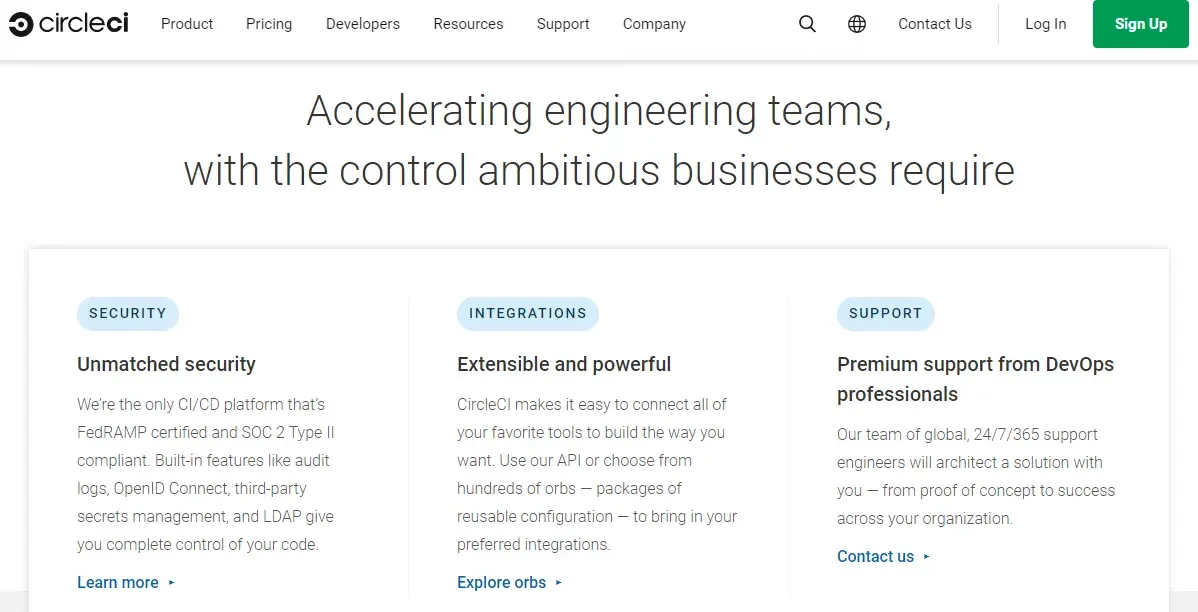
CircleCI enables engineers to build, test, and deploy software at scale. You can integrate it directly with your version control system, such as GitHub or Bitbucket, and it will validate your code changes in real time. CircleCI also helps manage your build logs, access controls, and testing. It is also highly customizable.
Key CircleCI features include:
- Automated parallelization and merging
- Executes builds through containers or clean virtual machines
- Use custom commands to upload packages
- Deployments are continuous and branch-specific
- Works in the cloud, private server, or self-hosted runner
- Supports Linux, Docker, Arm, Windows, GPU, and macOS systems
CircleCI Pricing: Free plan, Performance plan (cloud) – $15/month, Scale plan (cloud) – $2,000/month, Server plan (self-hosted) – Custom pricing
4. Codemagic CI/CD
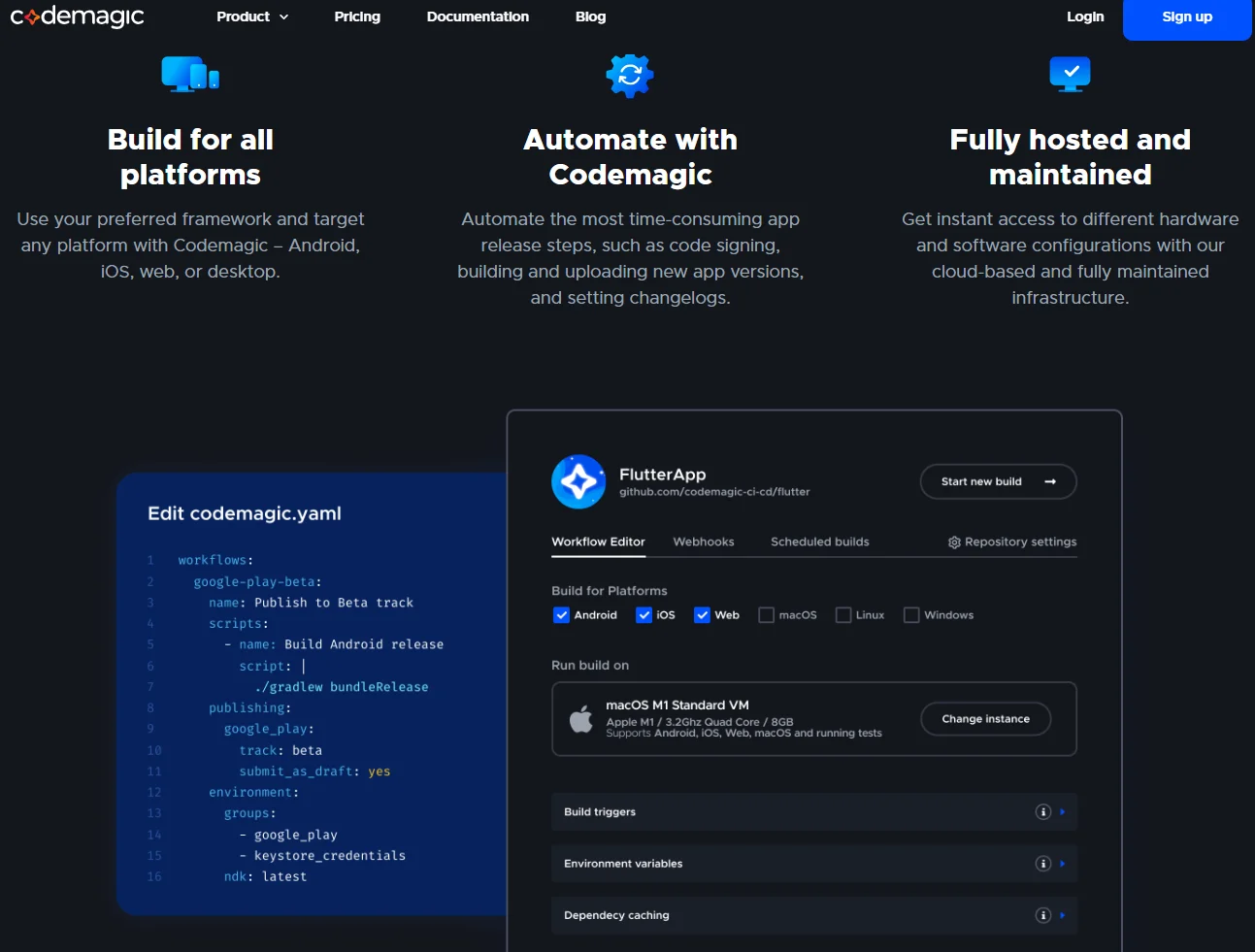
Formerly Nevercode, Codemagic automates the build, test, and deployment phases of mobile apps, whether you use standard or premium instances of Linux, Windows, or macOS build machines. Codemagic also integrates with most cloud-based or self-hosted Git repositories, like GitHub and Azure DevOps.
Key Codemagic features include:
- Test, build, and release mobile apps with a single CI/CD tool
- CI/CD for Native IOS, Flutter, React Native, Native Android, Unity, and Ionic
- Unit-test or use emulators, simulators, or actual devices to validate your apps
- Receive alerts via Slack with clear logs to pinpoint issues
- Choose between using codemagic.yaml or templates and auto project configuration for Flutter projects
Codemagic Pricing: For teams, pricing is Per build minutes or concurrency for Pay-as-you-go plan. Or, $3,990 per year in the fixed-price plan. Enterprise pricing is available from $12,000 per year.
5. Bamboo Data Center
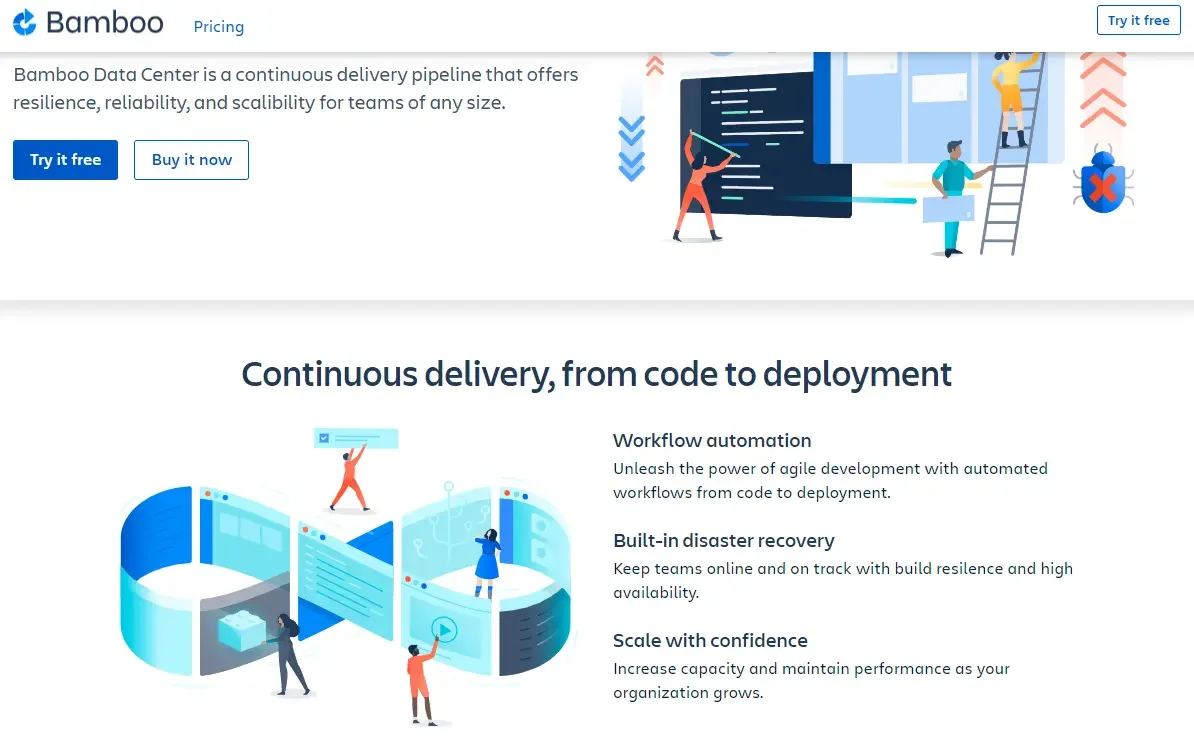
The Bambo Data Center combines automated builds, tests, and releases in a single workflow through its five building blocks; projects, plans, storage, jobs, and tasks). It also integrates with many tools to create your build and manage automatic pipelines. Plus, Bamboo CI/CD generates detailed reports and notifications.
Key Bamboo CI/CD features include:
- Native integration with the BitBucket Git repository, Jira collaboration platform, and Opsgenie for incident management
- Run build-tasks in parallel or sequentially
- Work with up to 100 remote build agents
- Perform parallel tests in batches
- Use AWS CodeDeploy or Docker for continuous delivery
Bamboo CI/CD Pricing: 30 days free trial, then starts at $1,200 per year for unlimited jobs and one remote agent. It goes up to $187,380 for unlimited jobs and 2,000 remote agents.
6. GitLab CI/CD
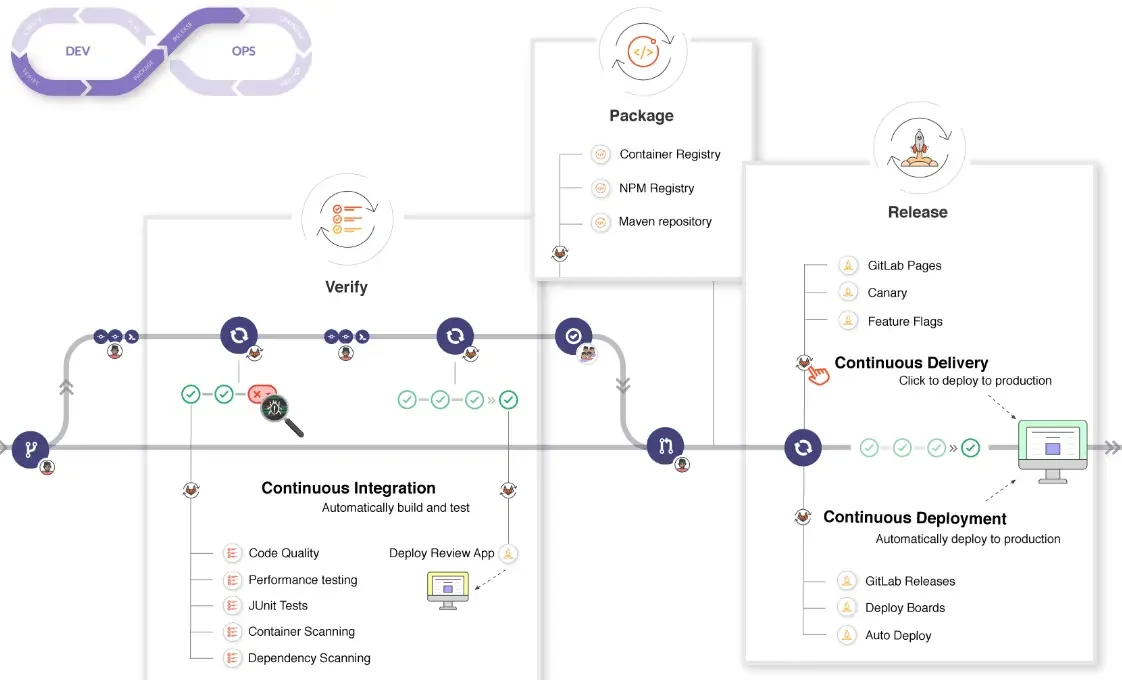
While GitLab is the Git-based repository system, GitLab CI/CD lets you build, test, and publish software without needing third-party integrations. It runs automated scripts in parallel or sequentially, provides change previews, and can quickly roll back changes in case of an error. There’s more.
Key GitLab CI/CD features include:
- Customize templates or write custom pipelines from scratch
- Security features; Dynamic application security testing (DAST), Container scanning, Dependency scanning, and Static application security testing (SAST)
- For GitLab.com (SaaS) the Linux, Windows, and macOS runners are already available. OR create your own runners.
- Leverage merge trains, multiple deployment environments, and parent-child pipelines to scale your CI/CD.
- In-context testing
GitLab CI/CD Pricing: Free – Up to 400 CI/CD minutes, 5 users, 10 GB transfer, and 5GB storage; Premium at $29/user/month (billed annually) – Up to 10,000 CI/CD minutes with support and 100GB transfer, etc; Ultimate plan – Custom pricing for up to 50,000 CI/CD minutes, 250GB storage, and 500GB transfer.
7. Travis CI
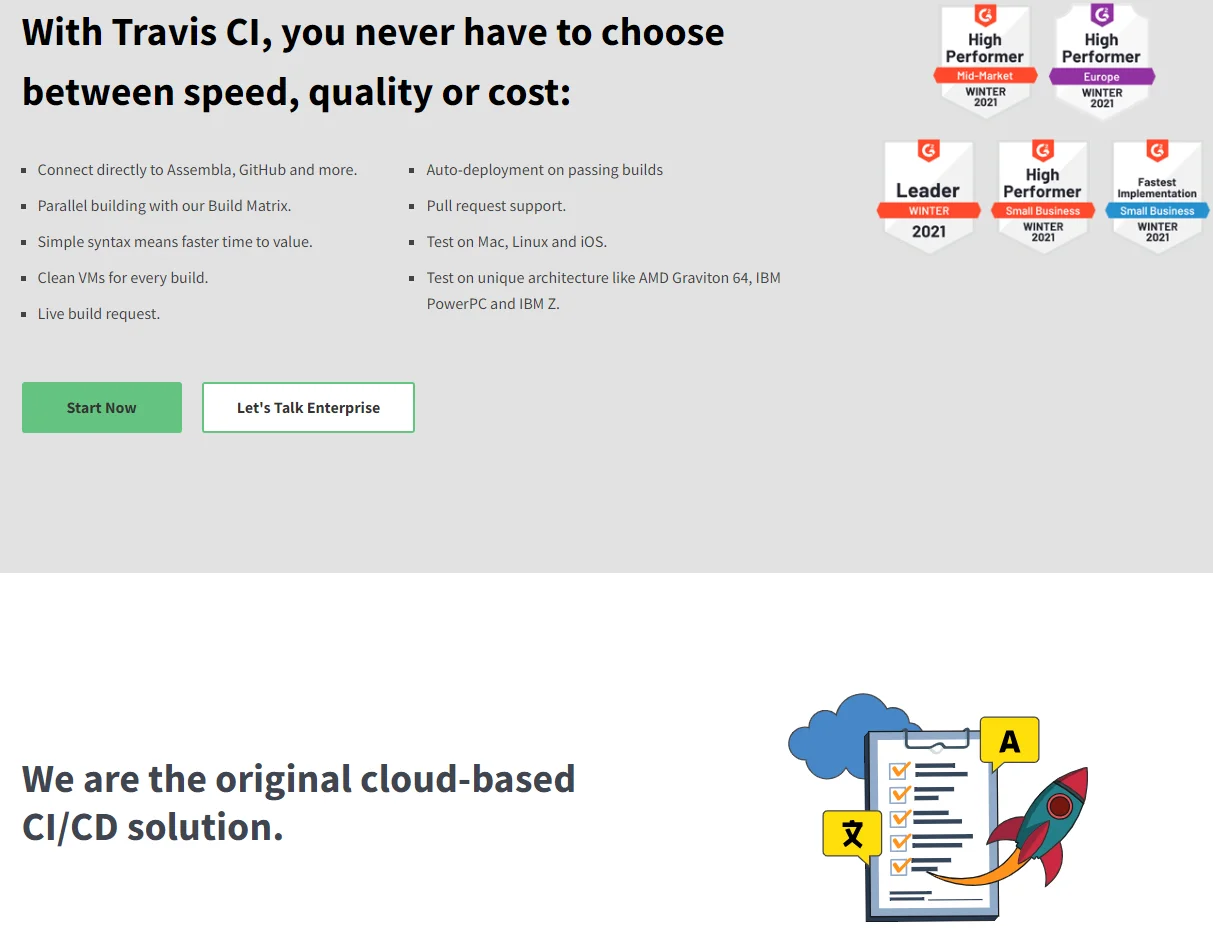
Travis CI was the first tool to offer Continuous Integration as a Service. It lets you sign up, link your favorite repository, build, and test apps. It also integrates seamlessly with common cloud repositories like GitHub, GitLab, and Bitbucket.
Travis CI runs in the cloud and features many automated CI options without requiring a dedicated server. This enables you to test code in different environments, machines, and operating systems.
Key Travis CI features include:
- Live build request
- Supports pull requests
- Run tests in Linux, IBM PowerPC, IBM Z, AMD Graviton 64, Mac, IOS, etc
- Perform multi-environment testing
- It’s Build Matrix tool supports 30+ coding languages and parallel building
Travis CI Pricing: Free for open source projects. Travis CI Enterprise Plan – $34 per user per month (self-hosted). Travis Cloud pricing — From $69 per month to $794+ per month.
8. Buildbot
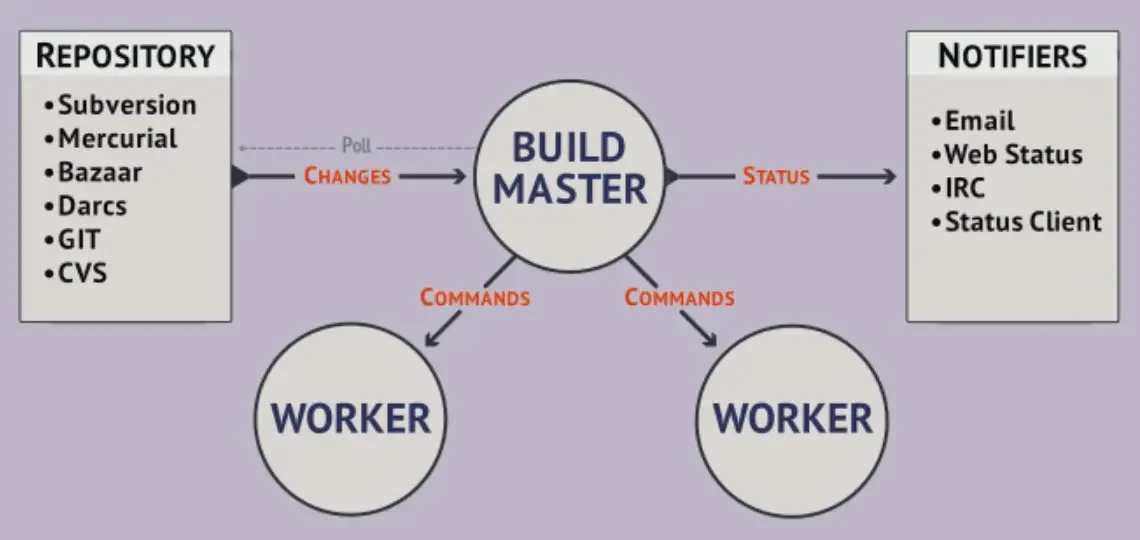
Buildbot is primarily a job scheduling tool for Python 3.0 and later. It automatically queues, executes, and reports on jobs whenever the resources it needs are available. An installation of Buildbot comprises a master and a collection of workers.
The master monitors source-code repositories for changes, coordinates tasks for workers, and reports outcomes to end users and developers. The workers can run on various operating systems, too.
Key Buildbot features include:
- Good job scheduling system; automates builds, tests, and releases
- Extensive status reporting
- Use Python 3.0 configuration scripts to configure the Buildbot master
- Execute jobs in parallel and across multiple platforms
- Flexible integration with version-control platforms
Buildbot Pricing: Free and open-source
9. TeamCity
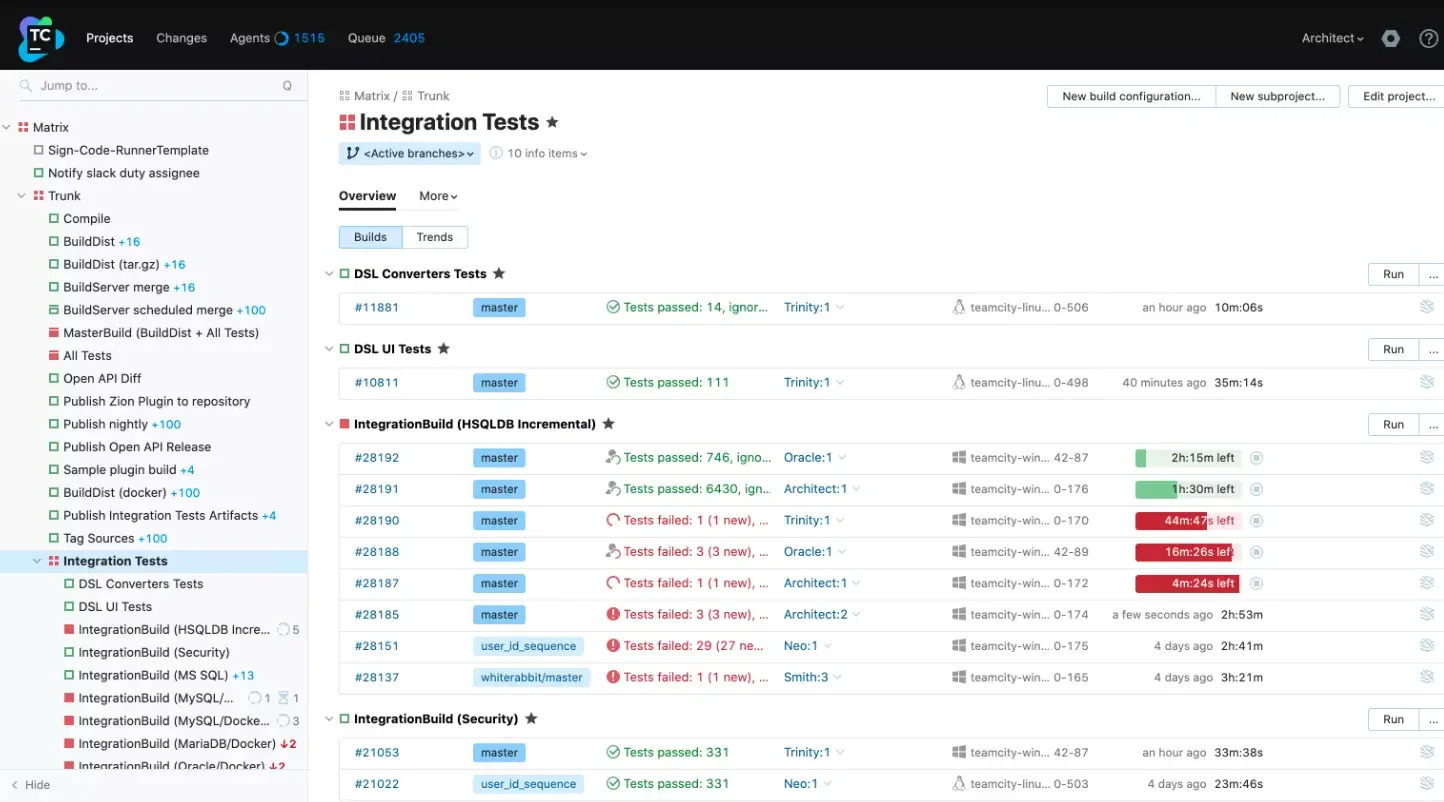
JetBrain’s TeamCity is an affordable CI/CD tool for teams and individuals. It is available as a software-based, self-hosted, on-premise solution or as a managed cloud service. It supports multi-platform development, extensive cloud integration, and advanced controls for complex builds.
Key TeamCity CI/CD features include:
- View and manage builds via the web interface
- Use its Kotlin DSL to manage build configurations as code
- Unlimited users and concurrency
- Various reusable settings and configuration options
- Run parallel builds in multiple environments
- Run history builds, view test history reports, pin builds, tag them, and add them to your favorites
TeamCity Pricing: TeamCity Cloud plan – $45 per month (14-day free trial), Professional server license (On-premises) – Free forever, Enterprise server license – From $1,999+ per year.
10. Codeship
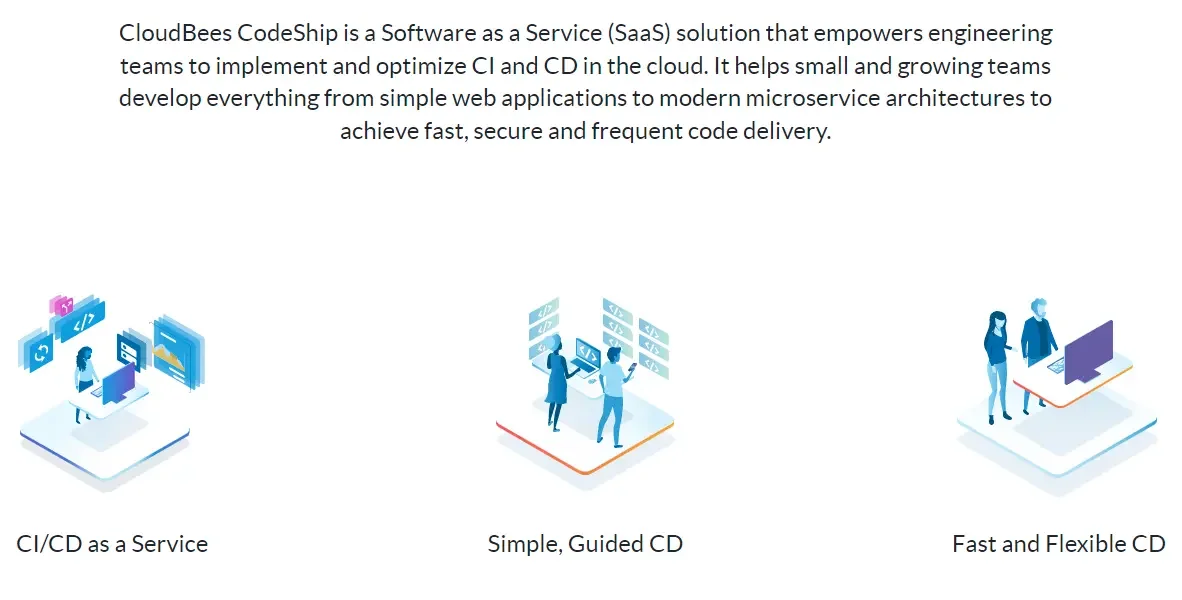
CodeBees’ Codeship provides CI/CD as a Service, simplifying setup, control, and operations at scale. It uses single-tenant AWS servers to improve security, performance, and reliability. Codeship also integrates with virtually any cloud, tool, or service so you can automate your CI/CD tasks anywhere.
Key Codeship features include:
- Push and pull images from any registry
- User-friendly UI and easy-to-use flows
- Set up preferred AWS instances type (dedicated single-tenant AWS instances)
- Integrate with any cloud, service, or tool
- Choose which steps to run sequentially or in parallel (and how many concurrent builds to run simultaneously)
- Scalable, repeatable, and self-service
Codeship Pricing: Free – Up to 100 builds/month, Basic plan – Starts from $49/month for unlimited builds, 2 parallel test pipelines, and 1 concurrent build, Pro plan – Up to 20 concurrent builds.
11. GoCD
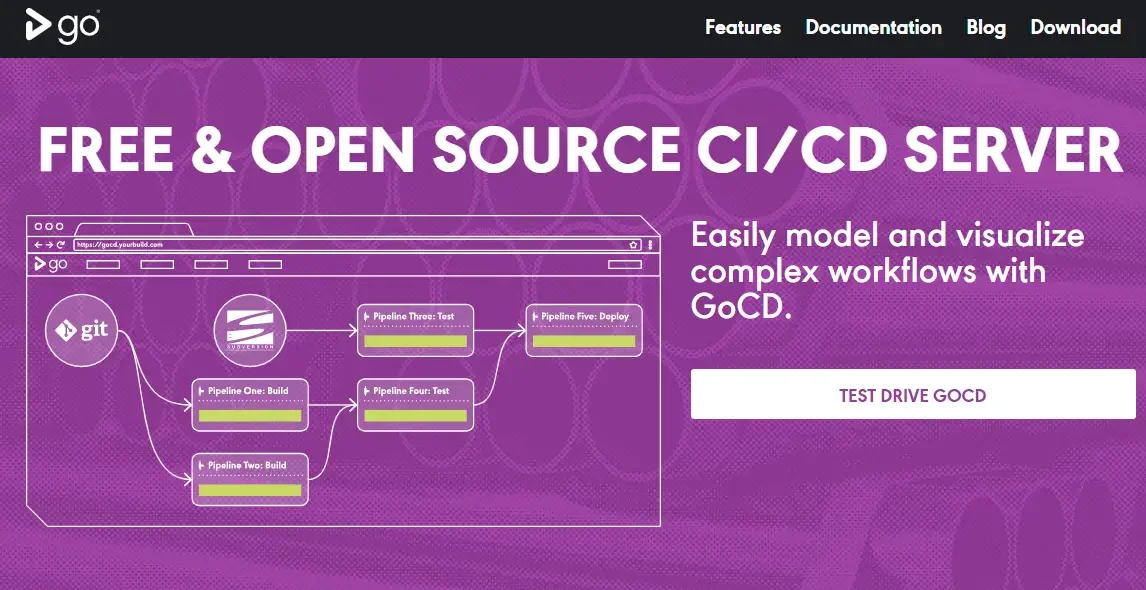
GoCD is a continuous delivery platform rather than a full-blown CI/CD tool. But it integrates with many CI tools to complete CI/CD pipelines. A major benefit of GoCD is its Value Stream Map feature, which helps companies visualize their CD pipelines. GoCD is available for Windows, Linux, and Mac and runs cloud-native deployment on environments such as Kubernetes, AWS, and Docker.
Key GoCD features include:
- View the entire path to production in a single view
- Use Parallel and cross-platform execution
- Includes dependency management with workflow modeling
- Compare commit messages and files across any two arbitrary builds
- Deploy any known good version of your app to wherever you choose with manual triggers
GoCD Pricing: Free and open-source
12. GitHub Actions
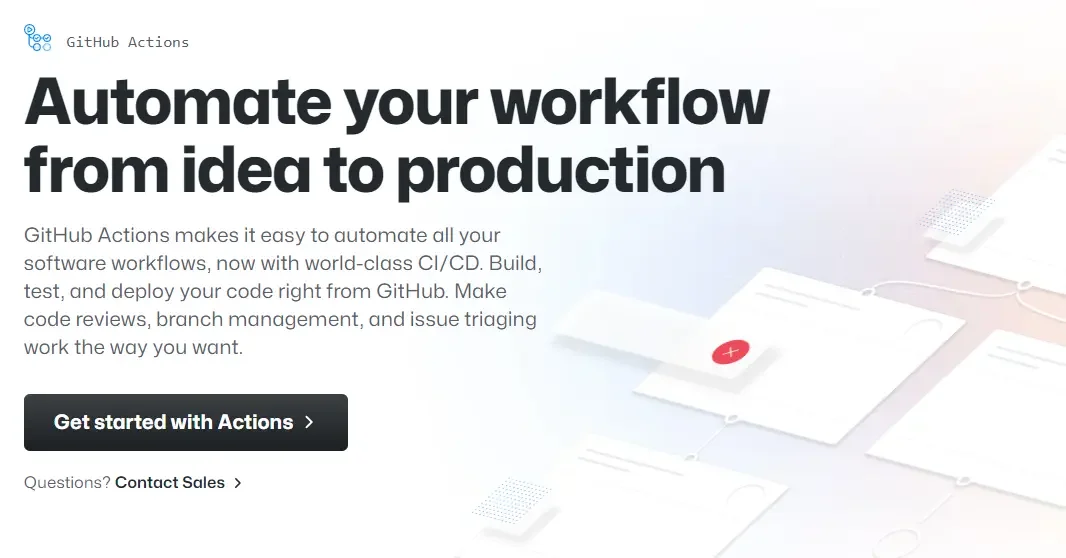
If you already use GitHub as your Git source code management platform, you can seamlessly connect it to Actions for CI/CD pipelines without needing third-party tooling. Its GitHub Actions enable workflow automation with GitHub events, from issue creation and push to code reviews to branch management. You can also use any language and run your builds on Linux, ARM, Windows, containers, and macOS.
Key GitHub Actions features include:
- Native integration with the GitHub code hosting, version control, and collaboration platform
- Build, test, and deploy using any language
- Easily test builds across multiple platforms and simultaneously (and versions of your runtime) with matrix workflows
- Runs inside a container or directly on a VM
- Includes a built-in secret store
GitHub Actions Pricing: Free for public repositories, Flexible pricing for private repositories (with 2,000 build minutes free); Team plan – $4 per user per month, Enterprise plan – $21 per user per month.
13. Semaphore
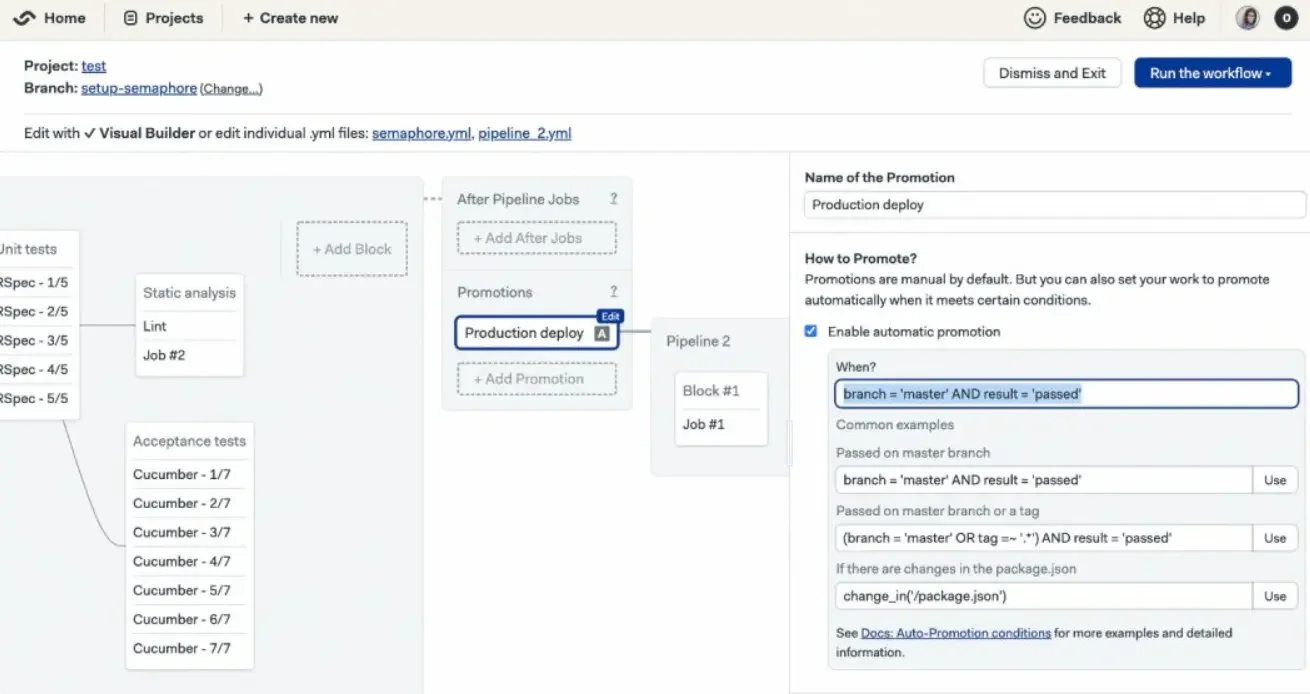
Semaphore defines CI/CD best practices with a pull request-based workflow. Other top features include cloud and on-premises hosting, native Docker and K8s support, secrets and dependency management, customizable stages, parallel execution, and control flow switches.
Key Semaphore features include:
- Use infrastructure as code to model sophisticated CI/CD pipelines.
- Cloud or on-premises hosting available
- Fully customizable CI/CD pipelines
- Define pipelines and build workflows fast with the Visual Workflow Builder
- Run in parallel or sequentially (includes full DAG support)
- Audit logs, SAML, and SCIM support helps improve security
Semaphore Pricing: Upon request. Includes a 14-day free trial for building with Linux, Docker, and macOS.
14. Spinnaker
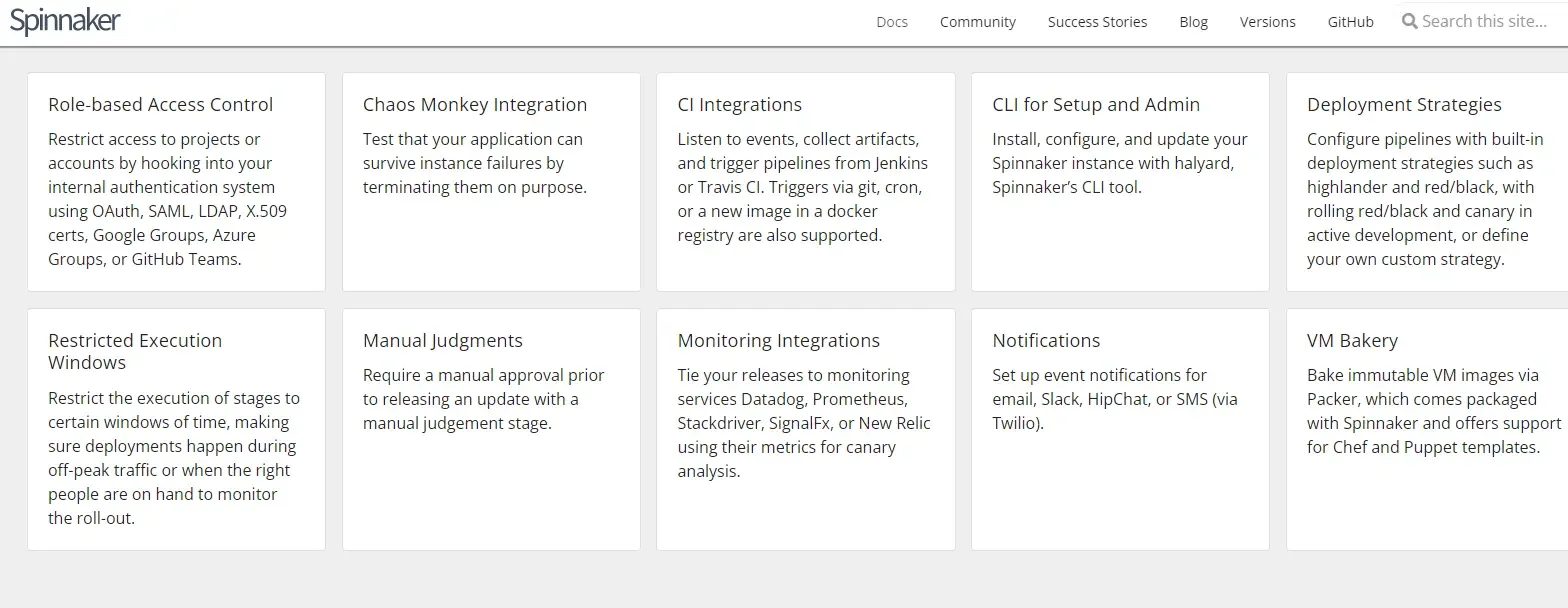
Spinnaker delivers an open-source, multi-cloud CI/CD platform. You can automate system tests, manage your rollouts, and trigger pipelines through git events. While it is a CD tool, it connects seamlessly with CI tools like Travis CI, Jenkins, Docker, and more integrations.
Key Spinnaker CI/CD features include:
- Enterprise-level multi-cloud CI/CD tool
- Use custom CI/CD workflows to track changes on specific files
- Skip unnecessary build and test stages to save time
- Deploy across the web, mobile apps, or desktop applications
- Trigger pipelines using git events, Docker, Jenkins, CRON, Travis CI, or other Spinnaker pipelines.
- Ensure that stages are executed within specific windows of time (such as during off-peak traffic or with the right people monitoring the rollout).
Spinnaker Pricing: Open-source
15. Harness CI/CD
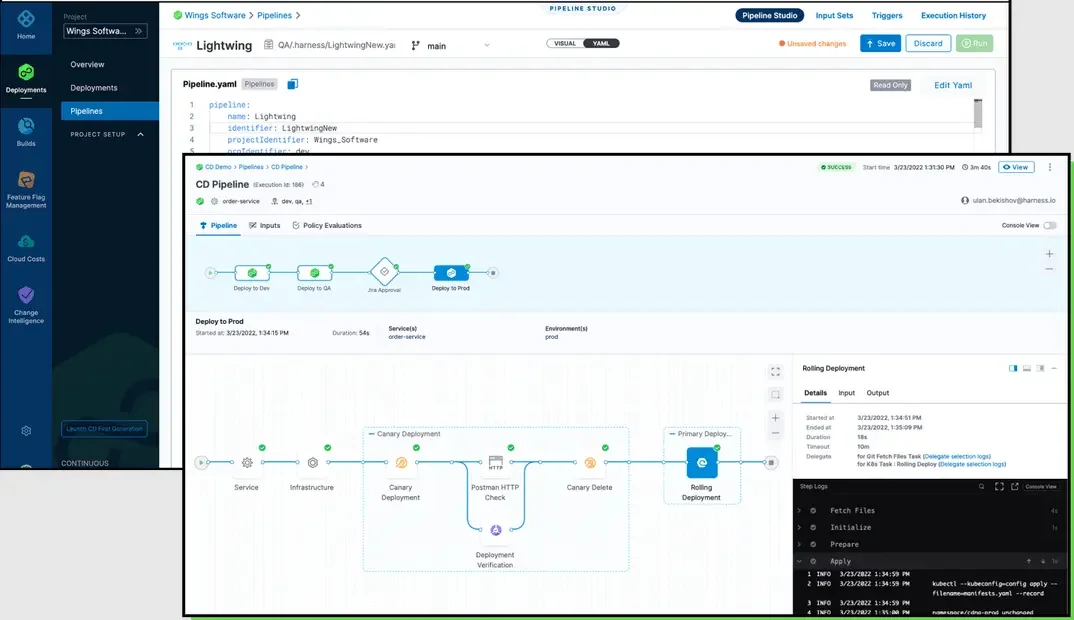
Harness acquired Drone CI to strengthen its CI/CD capabilities. With Harness CI, you get a self-service CI tool built on container technologies, meaning all extensions are standardized and builds are isolated. Harness CD delivers a self-service CD module for deploying as needed. No scripts, version dependencies, or plug-ins are required.
Key Harness CI features include:
- Harness now has its own code repository
- AI/ML powered deployment verifications
- Security throughout your pipeline with Security Testing Orchestration
- Built-in chaos engineering to test build resilience
- Build feature flag pipelines
- Internal developer portal supports service scorecards and catalog
Harness CI/CD Pricing: Varies by feature. For example, Continuous Delivery with GitOps costs $0 on the Free Plan, $100 per Service per Month on the Team Plan, and Custom pricing per Developer per Month on the Enterprise Plan.
For Continuous Integration, you’ll be billed $0 on the Free Plan, $25 per Service per Month under the Team Plan, and Custom pricing per Developer per Month on the Enterprise Plan.
16. DeployBot
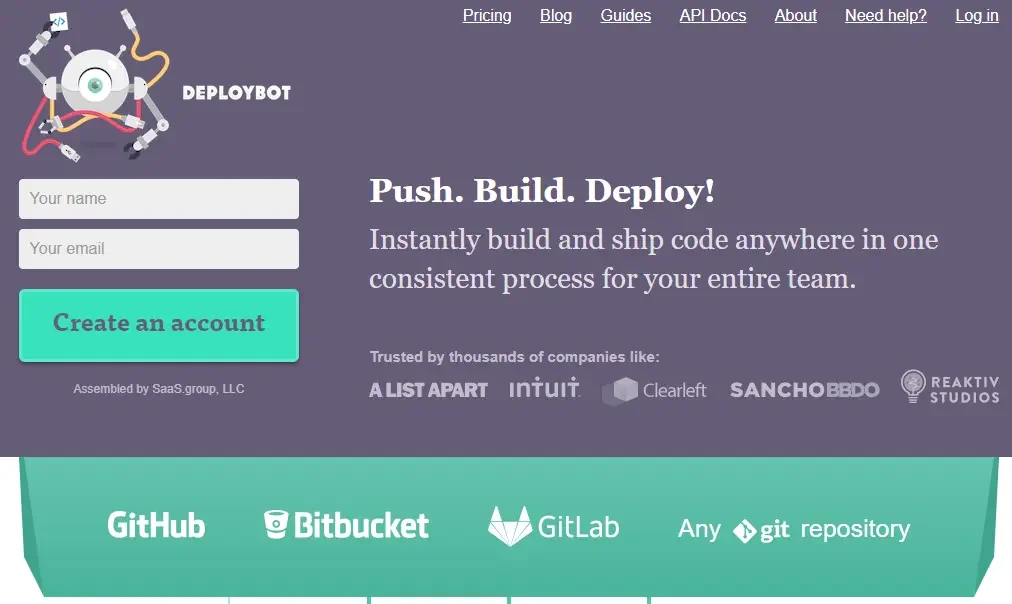
DeployBot is a build deployment management tool for manual and automatic releases. It also supports simultaneous multi-server deployments. DeployBot builds your code by fetching dependencies from repositories such as Node.JS, Composer, and NPM.
It has New Relic and Bugsnag integration, which helps you keep a close eye on the stability of your deployments. DeployBot also integrates with services such as Slack to deliver automatic notifications.
Key DeployBot features include:
- Compile or execute any code on DeployBot servers during the deployment, using custom or pre-defined Docker containers
- Run any shell scripts before, after, or during deployment on your own server
- Each of your deployment environments, such as staging or production, can deploy code from different branches to one or many servers concurrently
- Use automatic or manual deployments
- Easily integrate monitoring apps such as New Relic or Bugsnag to track deployment impacts on performance and app stability
DeployBot Pricing: Free plan – up to 10 servers and unlimited build minutes, Plus plan – $25 per month up to 600 servers and 20 repositories, Premium plan – $50 per month up to 1,000 servers and 50 repos.
17. Azure Pipelines
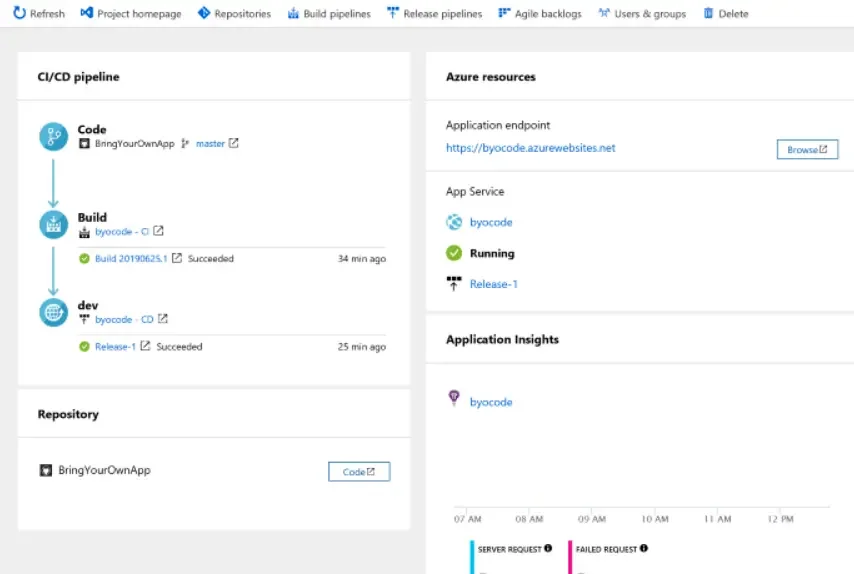
Azure Pipelines is one of the standalone services under the Azure DevOps suite of collaborative services. Azure Pipelines helps you build, test, and deploy all your projects with any language and on any platform. It enables fast builds by integrating deep with GitHub pull requests, statuses, and checks. It also works seamlessly with containers, Kubernetes, YAML, and deployments to any cloud. Plus, it is free for open-source projects.
Key Azure Pipelines features include:
- Automatically build and test your code projects
- Works on any projects type
- Deliver code to any destination
- Use any Git-based or Azure Repos version control systems
- Run your apps in parallel on Linux, Windows, and macOS
- Supports multiple deployment targets; VMs, on-premises, containers, mobile app stores, cloud platform, PaaS service, etc
Azure Pipelines Pricing: Free up to 10 open-source projects; $40/month for each parallel job and 1,800 minutes for Microsoft-hosted CI/CD; $15/month per extra parallel job with unlimited minutes.
18. Concourse
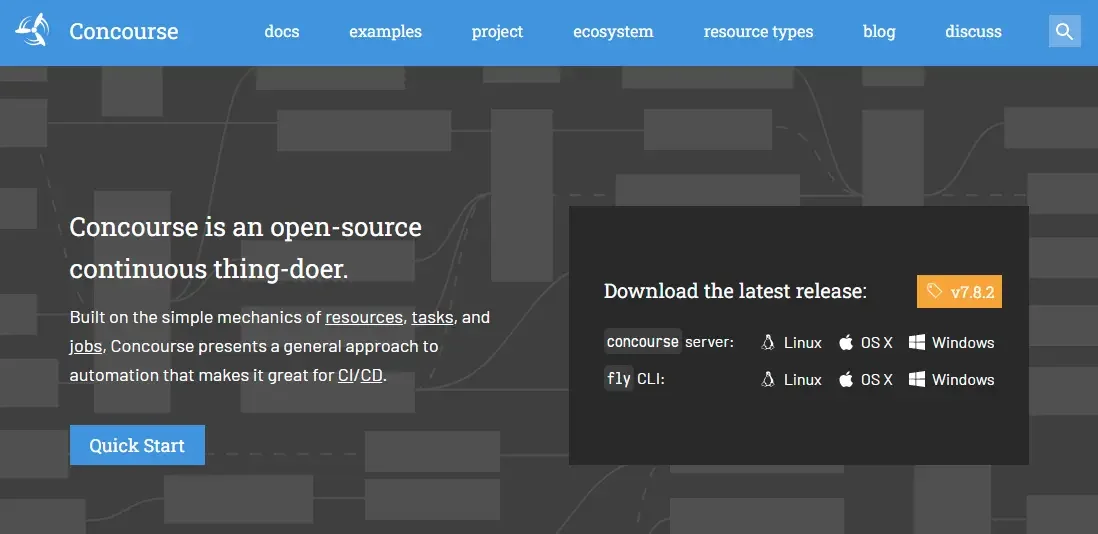
This Go-based automation platform enables you to build, test, and deploy projects on virtually any automation pipeline at scale. It is open-source, container-based, and opinionated.
A Concourse pipeline resembles a continuous and distributed Makefile. In each job, there is a build plan that declares the job’s input resources and what you can run with them when they change.
Key Concourse features include:
- Based on resources, tasks, and jobs
- Container-based CI/CD platform
- Open-source CI/CD tool with a community-run roadmap
- Visualize your pipeline in the web UI
- Reproducible and debuggable builds
- Clean environment on each run
Concourse Pricing: Free and open-source
19. Bitrise
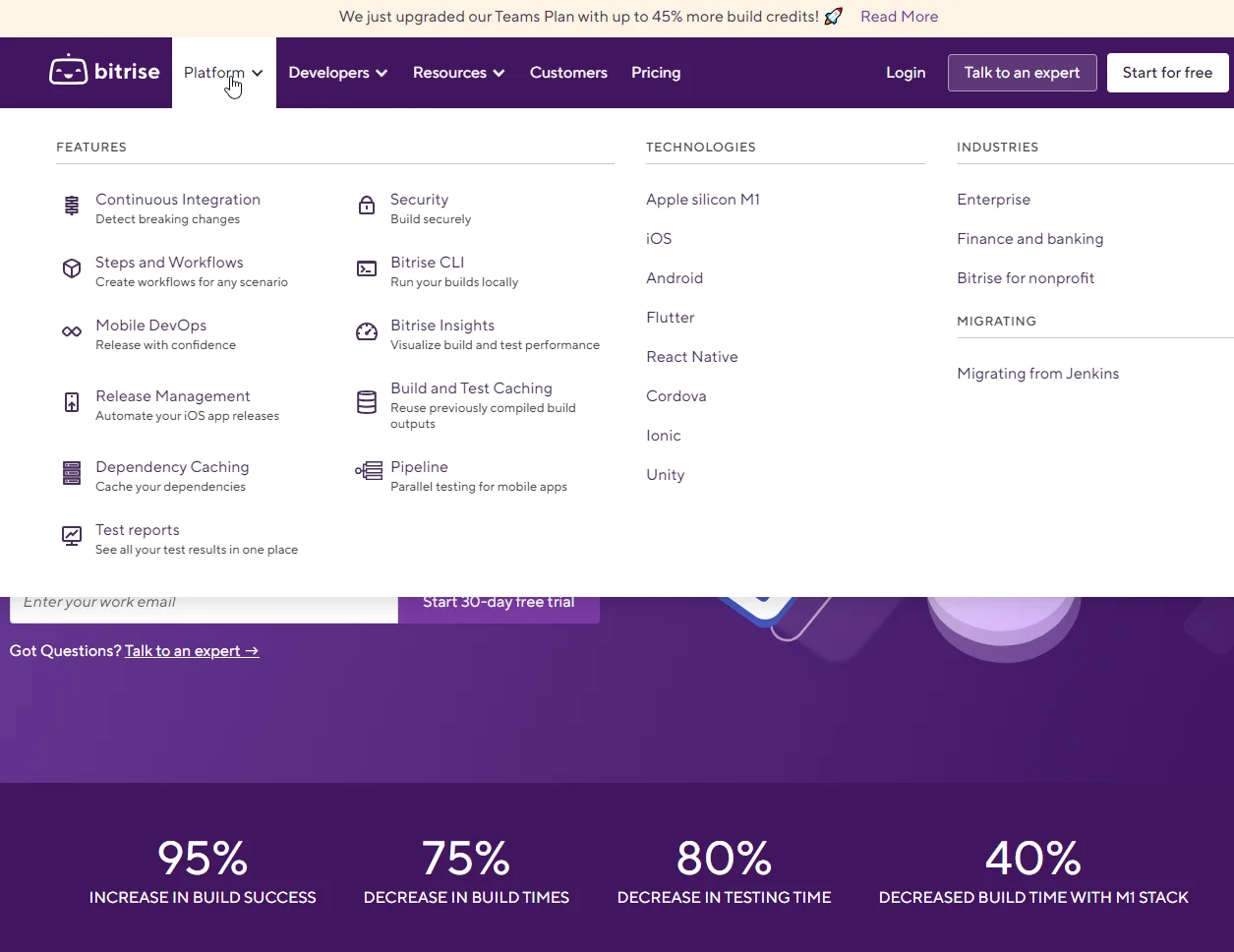
Like Codemagic, Bitrise is a CI/CD tool for developing, testing, and rolling out mobile apps. The mobile CI/CD automatically configures workflows so you can simplify integrating and deploying your Android, React, IOS, Native, flutter, and macOS apps. It works with GitHub, GitLab, and BitBucket, including the Enterprise editions.
Key Bitrise CI/CD features include:
- Automate CI/CD for mobile apps, including packaging the apps and pushing them to a mobile apps store
- Use pre-built workflows or build your own to guide the CI/CD automation
- Define environments that support your development goals
- Quickly push your mobile app to test devices, simulators, or stores.
Bitrise Pricing: Free for students and individuals. 30-day free trial. The starter plan costs $99 per month for up to 10 team members and unlimited monthly build credits. Team pricing is $225/month for unlimited team members and 10 concurrent builds. Custom pricing on Enterprise plan.
20. Codefresh
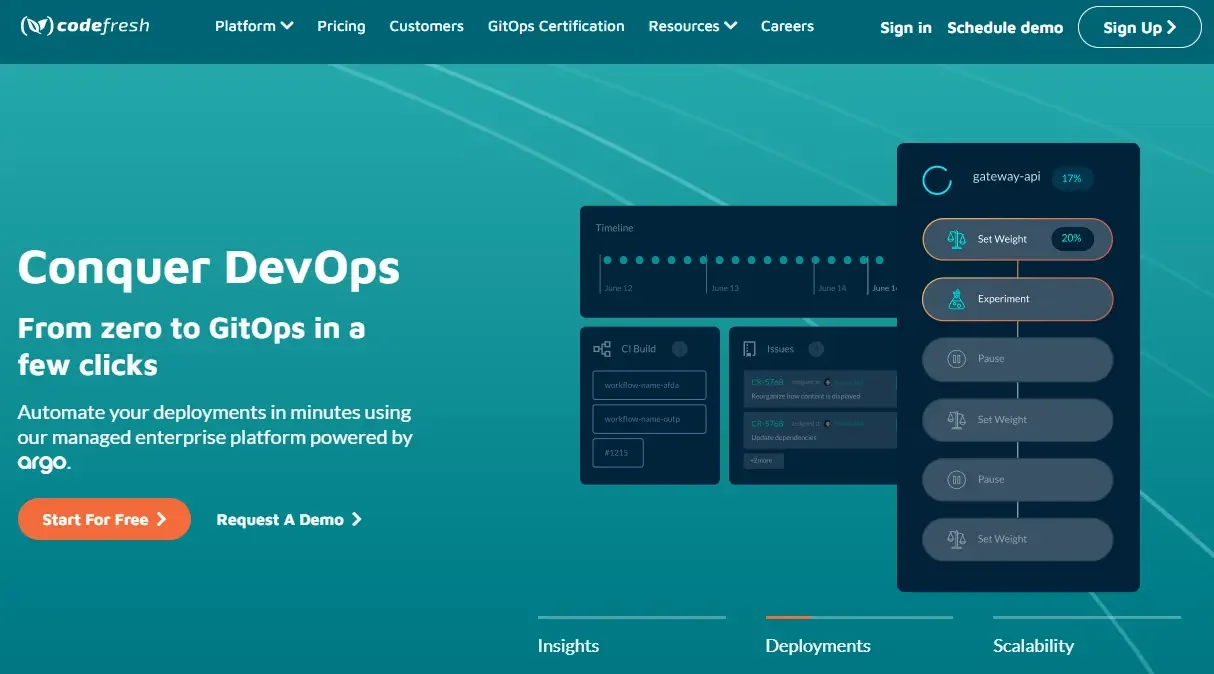
This Kubernetes native CI/CD solution is also among the few tools offering straightforward Docker registry integration across all pipelines. It also enables you to build docker images as needed directly in the pipeline. Codefresh integrates neatly with other tools, from GitHub Actions to Jenkins.
Key Codefresh features include:
- Built on Argo to support declarative continuous delivery
- Use live debugging with breakpoints
- Take advantage of DRY sharable pipelines
- Simple yet powerful container-based steps
- Zero management overhead
Codefresh Pricing: Free Community Edition up to 5 developers and 1,000 cloud credits per month; Team plan is $76/developer/month up to 15 developers and 1,000 cloud credits per month; Enterprise – custom pricing for unlimited developers and 1,000 cloud credits per month.
21. Bitbucket CI/CD
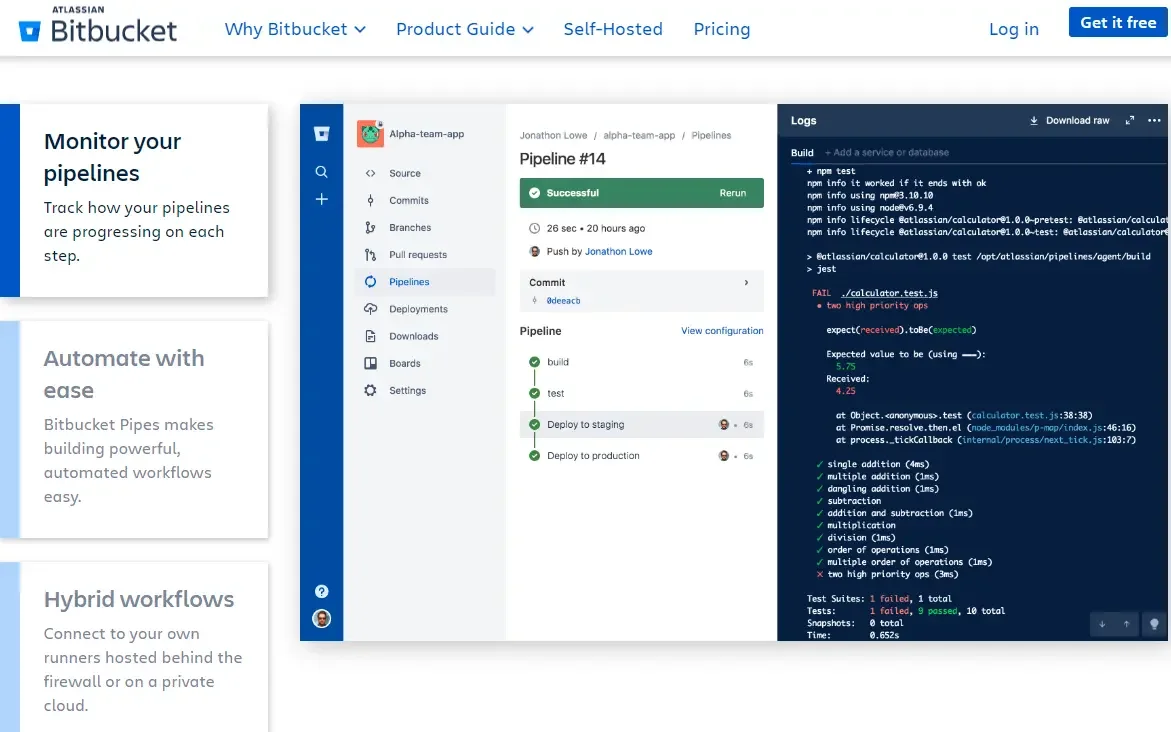
Building your projects with BitBucket CI/CD means developing right next to your code – if you use Bitbucket as your Git repository. That means you won’t need servers, third-party repositories, and special configuration to get going. It also integrates natively with JIRA agile project management.
Key BitBucket CI/CD features include:
- Includes its own Git-based code repository (BitBucket), so there’s no complex repository synchronization required
- Supports most languages and platforms
- Includes language-specific templates to ease set up and configuration
- Create automated workflows with BitBucket Pipes
- Ntive integration with Jira to support continuous visibility, from backlog to deployment, step by step
- Easily manage deployments on the Deployment Summary
- Map the branch structure
Bitbucket Pricing: Free up to 5 users, 1o deployment environments, and 50 build minutes/month; Standard plan – $3/user/month with unlimited users, 2,500 build minutes/month, and 100 deployment environments; Premium – $6/user/month with 3,500 build minutes, and 100 deployment environments.
22. AppVeyor CI/CD
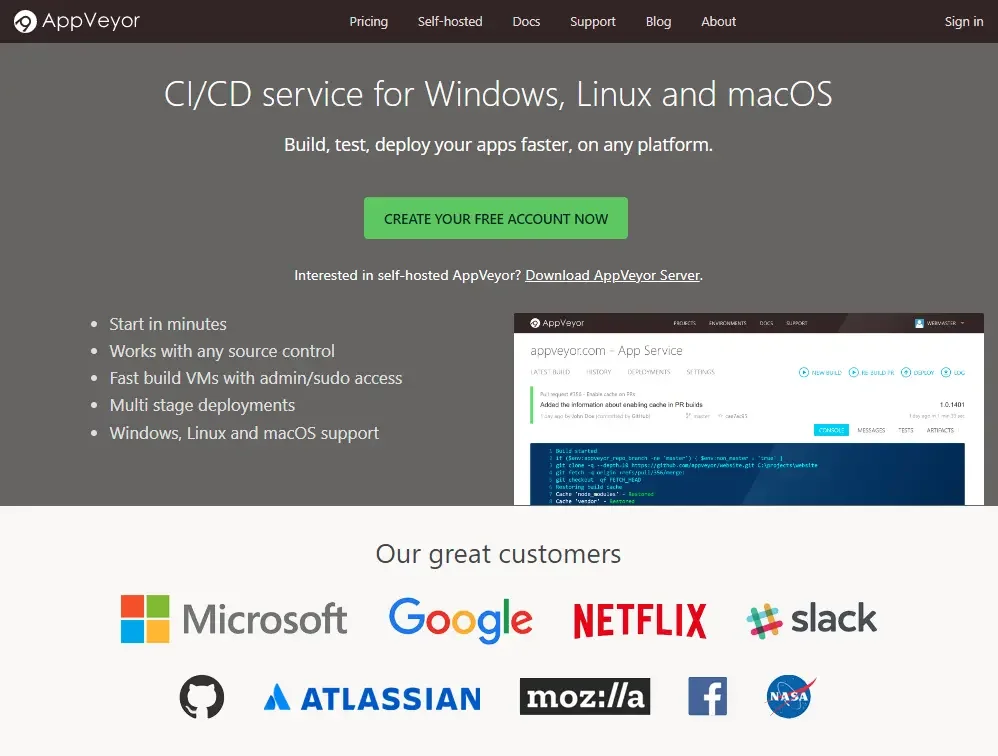
With AppVeyor, you get a CI/CD platform for .NET applications. You can use a NuGet server, complete with support and a bubbling community. It also supports custom reports as well as GitHub (including Enterprise), GitLab, Bitbucket, Azure Repos, Gitea, and Kiln.
Key AppVeyor features include:
- Supports multi-stage deployments
- Use any source code control platform
- Build, test, and deploy on Linux, Windows, and macOS
- Uses isolated, clean environments for each build
- Configure builds via UI or in versioned YAML
AppVeyor CI/CD Pricing: Free for unlimited public projects; Basic – $29/month for 1 concurrent job, 1 private project, and 5 self-hosted jobs; $59/month for unlimited private projects, 1 concurrent job, and 5 self-hosted jobs; Premium – $99/month for unlimited private projects, 2 concurrent jobs, and 5 self-hosted jobs.
23. Flux by WeaveWorks
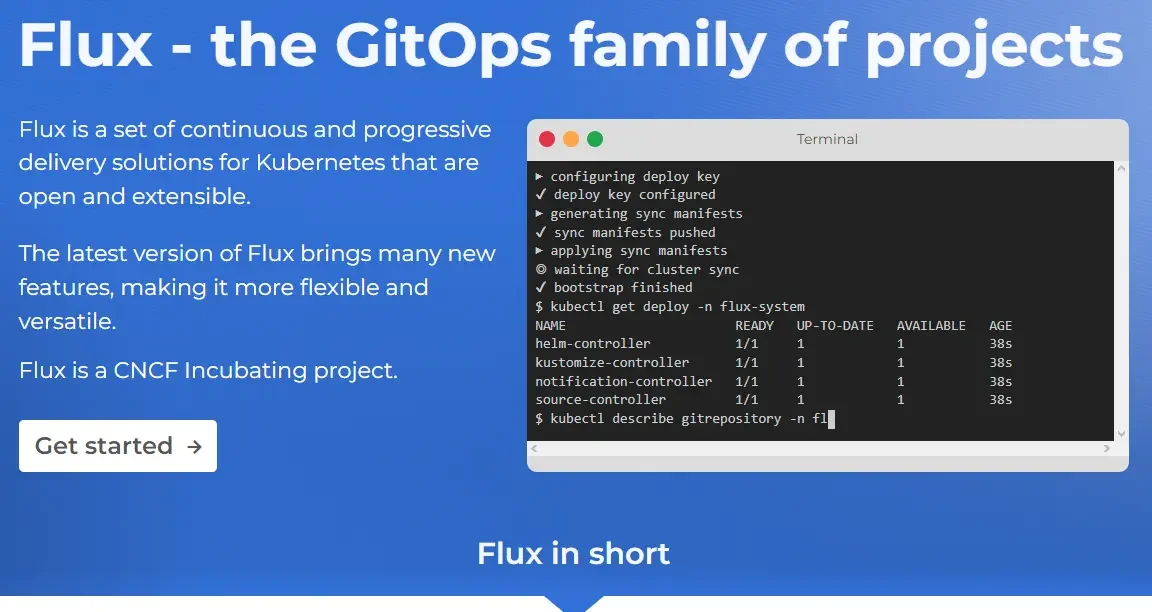
With Flux, you can continuously deliver user-facing apps and infrastructure using version control for each step. This ensures reversibility, audibility, and reproducibility. Your team can deploy code as soon as they create it and swiftly roll back if necessary.
Key Flux features include:
- Core is the free, open-source platform that declaratively automates app delivery
- Enterprise is the continuous operations tool for teams to implement Kubernetes-based GitOps at any scale.
- Automatically detects new images and updates relevant services in your cluster as per your policy
- GitOps supported for both infrastructure and applications
- It does multi-tenancy
- Enterprise edition includes a rich library of vetted cloud-native stacks
Flux Pricing: Free and Enterprise (custom pricing upon request)
Now, even the best CI/CD tools cannot work in a vacuum. In the following sections, we’ll cover the other DevOps tools you may need to run successful CI/CD workflows.
24. Kapstan
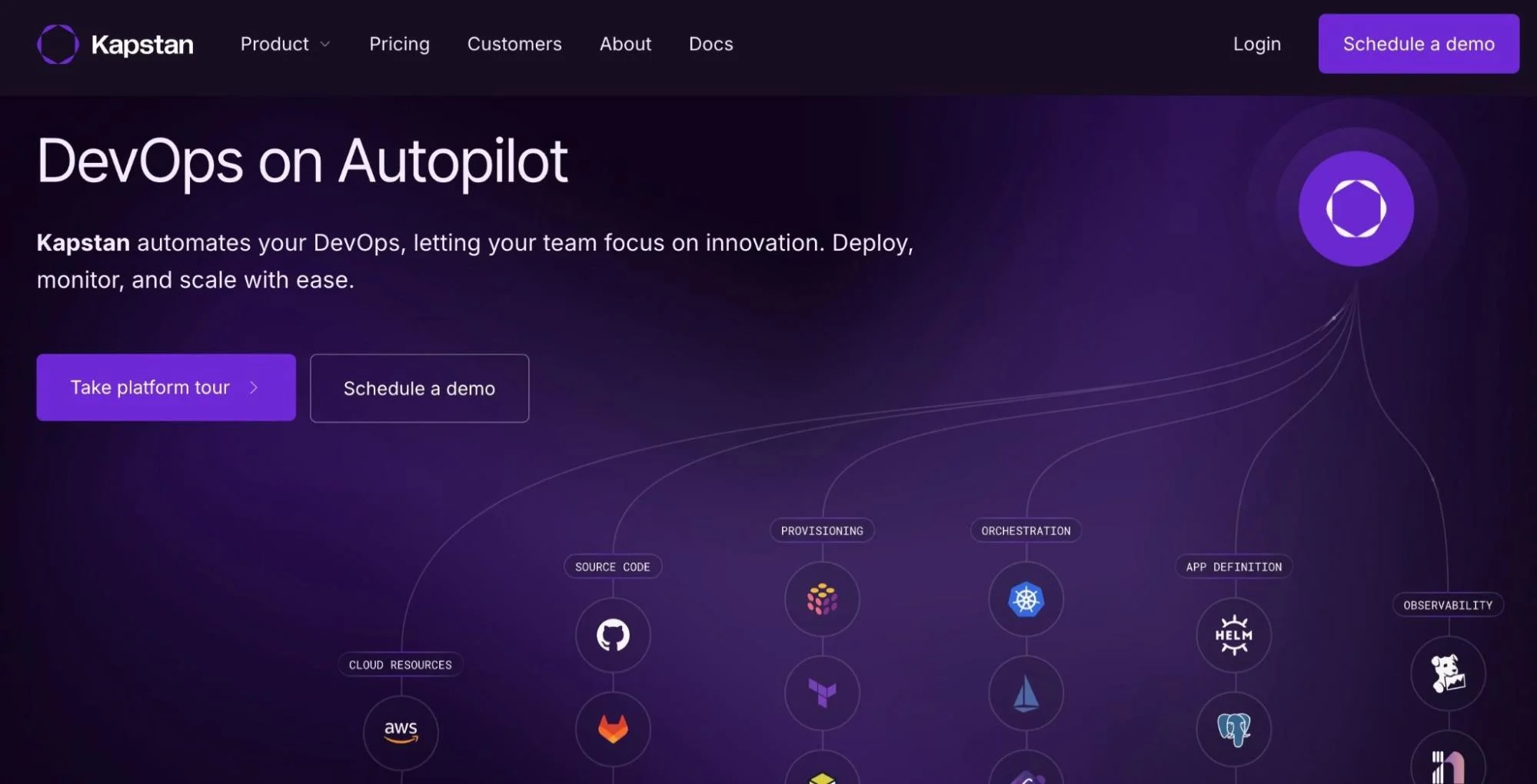
Kapstan is an internal developer platform (IDP) that automates the entire CI/CD process, from code integration to deployment. It integrates with version control systems like GitHub and Bitbucket for seamless code pushes.
Kapstan key features include:
- Sets up and scales infrastructure automatically
- Enables users to create, clone, manage, and control access to different deployment environments
- Reduces deployment time and errors through one-click deployments
- Offers real-time insights on performance
- Protects data with a built-in secret manager
- Restricts access based on user roles
Kapstan pricing: Growth Plan – one-month free trial, Scale Plan – custom pricing based on requirements.
Cloud Cost Management Tools
Cloud cost management enables you to view, monitor, and optimize your cloud spend. While some provide overviews, others deliver detailed unit costs, like cost per customer, cost per software feature, etc. Here are five of the best:
25. CloudZero
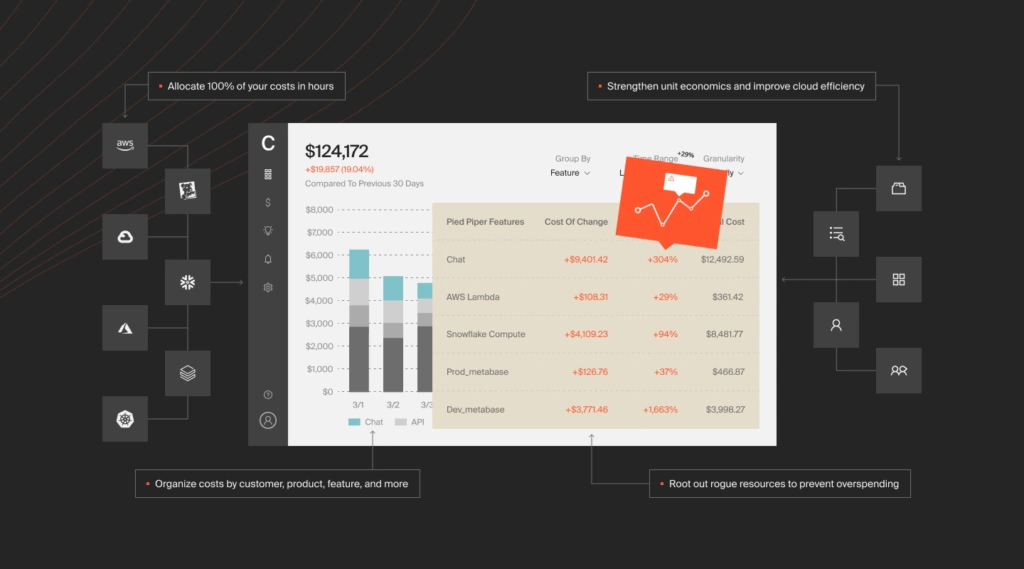
CloudZero provides cloud cost intelligence for engineering, FinOps, and finance teams. With CloudZero, you can map cloud costs to specific products, features, teams, and more without endless manual tagging.
CloudZero AnyCost is multi-cloud and empowers you to view, understand, and optimize your cloud spend across Amazon Web Services (AWS), Microsoft Azure, and Google Cloud Platform (GCP). Also, you can view your costs by customer, feature, dev team, and more, across services such as Snowflake and Kubernetes.
Key CloudZero features include:
- Get in-depth and accurate cost insights for each hour by combining cost data with infrastructure and application data (no endless tagging or perfect tags required)
- View your CI/CD costs per unit; Cost per Customer, per Team, per Feature, per deployment, per Service, per Environment, and more out-of-the-box or custom dimensions
- Engineering-Led Optimization (ELO) approach provides your engineers with near-real-time insights into the cost impacts of their activities, allowing them to build more cost-effective solutions.
- Real-time cost allocation enables you to see the impact of deployments almost immediately to avoid overspending
- Take advantage of real-time cost anomaly detection to receive timely, context-rich alerts via Slack, email, etc.
CloudZero Pricing: Tiered pricing that’s stable, predictable, and won’t vary month to month upon request.
Want to see more first? CloudZero is built to empower engineers to understand cloud costs in their language, align with FinOps and Finance, and build cost-effective solutions at the architecture level.  to experience CloudZero’s ELO in action yourself!
to experience CloudZero’s ELO in action yourself!
26. AWS Cost Explorer
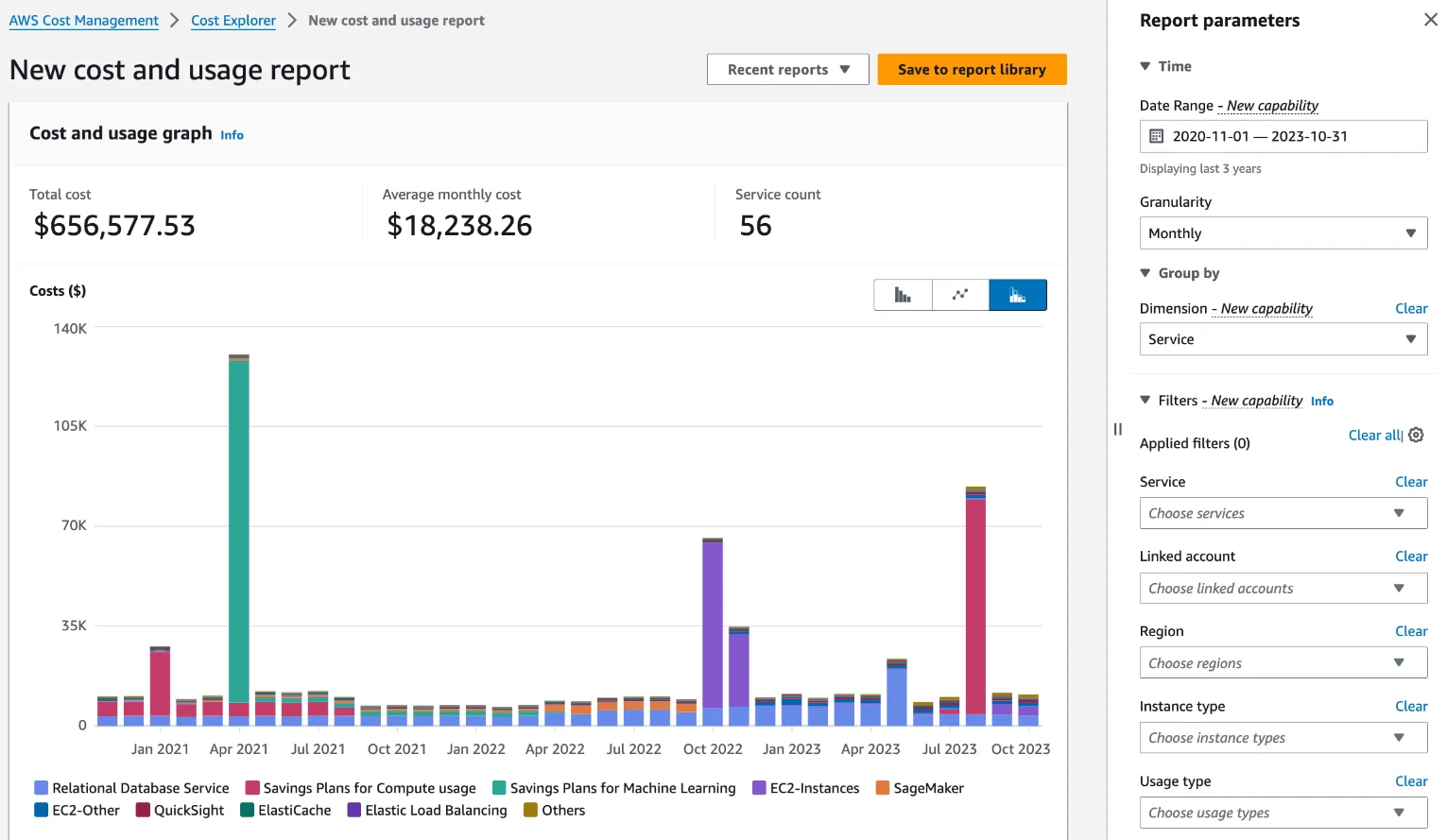
AWS Cost Explorer helps visualize, analyze, and manage AWS costs. You can sort and group your figures by usage type and tag — daily or grouped by month. It comprises four different parts — AWS Budgets, AWS Budgets Reports, AWS Cost Explorer API, and AWS Cost Explorer and Resource Granularity. You’re charged for each portion of the service you use.
Key AWS Explorer features include:
- Provides a centralized view of the usage of various AWS services and their associated costs
- Generate custom usage and cost reports
- Get a cost report at least once every 24 hours
- Filter and group costs by various parameters, such as by service, team, and linked accounts
- Perform cost forecasting based on historical (12 previous months) and current month’s costs reports
- Monitor hourly- or resource-level cost and usage insights for past 14 days
AWS Cost Explorer Pricing: AWS Cost Explorer Hourly and Resource Granularity – $0.01 per 1000 UsageRecords per month, AWS Cost Explorer API – $0.01 for each request, AWS Budgets Reports – $0.01 per report, AWS Budgets – First two action-enabled budgets are free per month (subsequent budgets will cost you $0.10 daily)
27. Xosphere
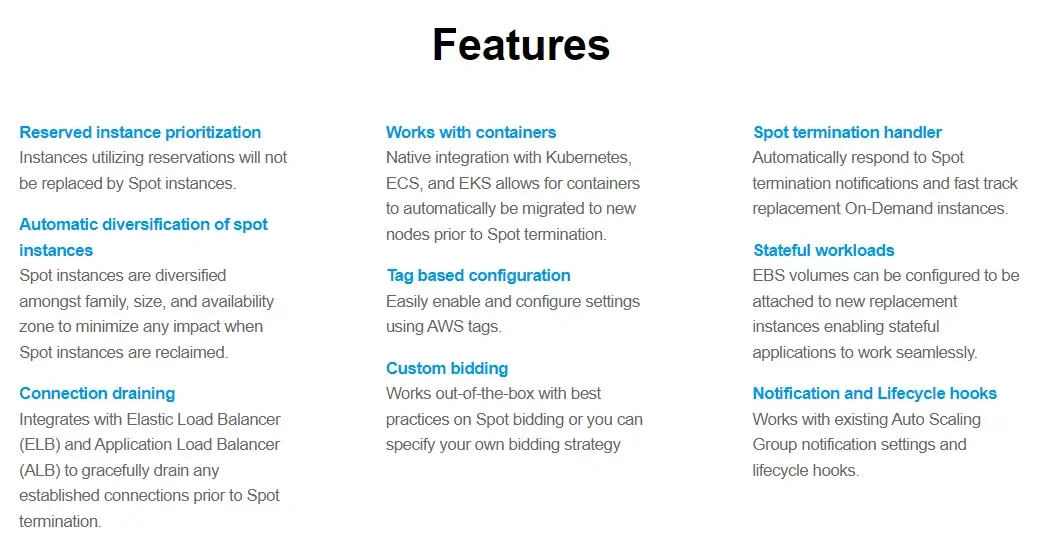
Xosphere helps AWS customers use Spot instances to optimize the costs associated with their CI/CD activities. It does this by automatically switching workloads from the more costly On-Demand instances to the most cost-effective Spot instances whenever they are available at a reasonable price.
Key Xosphere features include:
- Switch workloads to and from On-Demand and Spot instances without downtime
- Works with containers; Kubernetes, Amazon ECS and Amazon EKS
- Prioritizes (not replaces) Reserved instances (RIs)
- Supports custom Spot price bidding
- Configure and enable settings using AWS tags
- Automatically diversifies Spot instances across family, size, and AWS Availability Zone (AZ)
Xosphere Pricing: Per hour per Spot Instance
28. ProsperOps
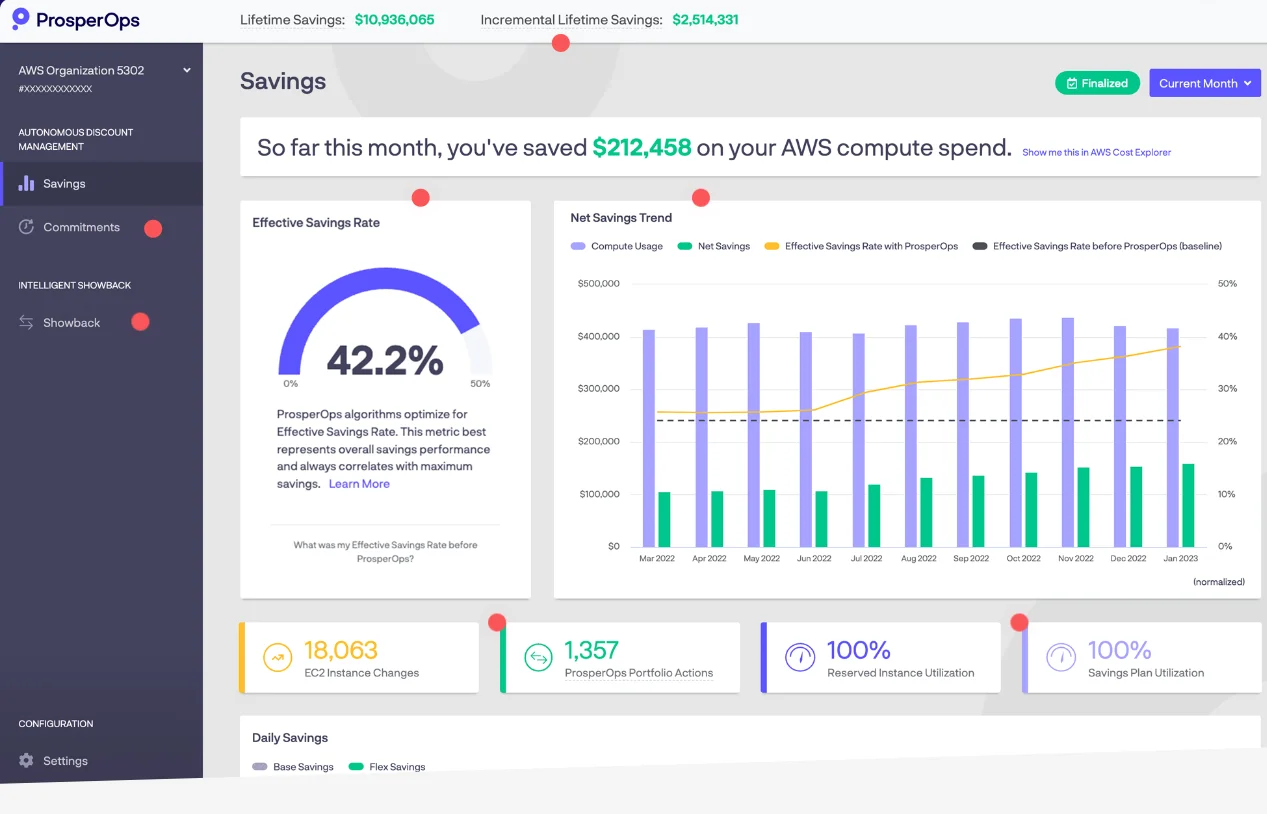
ProsperOps offers a free savings analysis solution that pulls detailed data that would take a team at least a week to gather manually. You’ll see your spending over the past year, how effective you’ve been in using your savings instruments, the state of your commitment capacity planning, and how your results compare with your peers.
Key ProsperOps features include:
- Autonomous convertible RIs and Savings Plans for AWS
- Automatically adjusts commitment discounts to your desired state
- Smart budgeting to manage commitment risk
- View cost and savings across AWS regions, service types, and resources
- Monitor all prepaid commitments’ amortization schedules automatically; updated daily
- Analyze financial results across all your AWS organizations for savings, commitment coverage, compute spend, Effective Savings Rate (ESR), and more
ProsperOps Pricing: Percentage of savings for Enterprise Plan
DevOps Collaboration And Agile Project Management Tools
Application lifecycle management tools enable you to monitor and manage their applications from conception to retirement. The following tools ensure optimal delivery cycles and smooth transitioning.
29. Jira
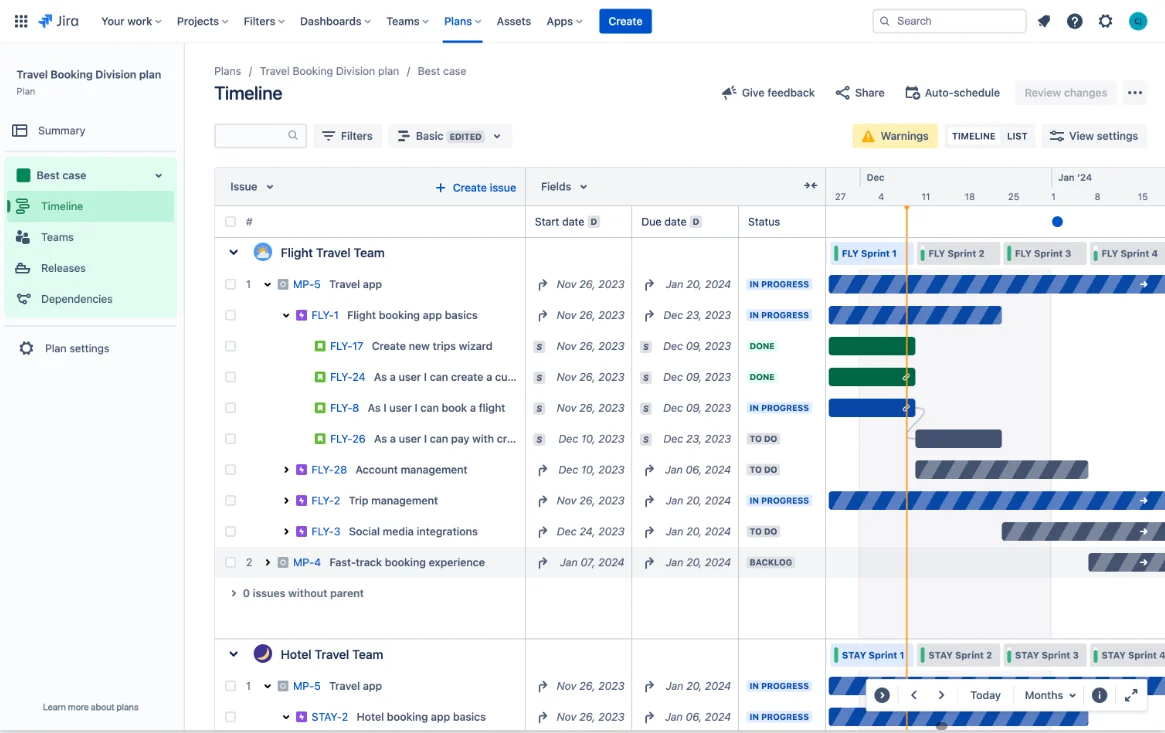
Atlassian’s Jira is a developer-centric, Agile project development platform. It lets your DevOps team plan, track, release, and generate reports of your CI/CD activities at any scale. Jira includes ready-to-use templates to get you started quicker with Kanban, Scrum, roadmaps, and bug-tracking workflows. It also integrates with virtually any DevOps work tool.
Key Jira features include:
- Combine team collaboration with issue-tracking tools in one platform
- Use workflow templates to get start and pre-configured/custom views to track project progress, dependencies, and issue progress across projects and teams
- Track work status however and wherever you prefer; burndown, sprint, and velocity charts as well as with cumulative flow diagrams.
- Supports bug tracking and restricts who has access to debug a specific bug, app, or service
- Use interactive timelines to map dependencies, work items, and epics.
Jira Pricing: Per user per month, starting Free with 10 users, Scrum, and Kanban boards support; Standard plan – $8.15/user/month for up to 35,000 users, Premium plan – $16/user/month for up to 35,000 users and advanced roadmaps; Enterprise – Custom pricing.
30. Asana
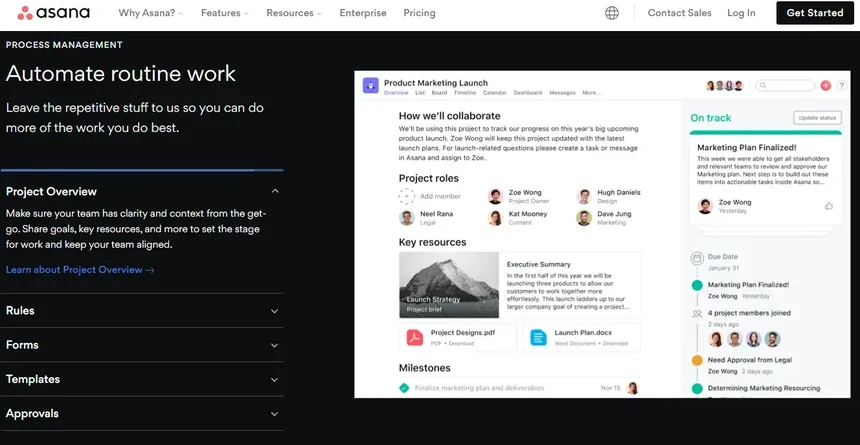
The Asana task management service helps teams coordinate and synchronize their work. These can range from everyday tasks to special projects. There are desktop, web, and mobile versions of Asana, all of which provide List, Board, and Timeline views of tasks. You can also integrate and connect Asana with other tools, including Microsoft Teams, Adobe Creative Cloud, Slack, Tableau, Microsoft Office 365, Power Bi, etc.
Key Asana features include:
- Break down and assign work by tasks and projects in a shared hub
- Use IT workflows and automation to streamline your CI/CD projects; templates, rules, forms, bundles, etc
- Organize work with various views; Kzanban, lists, Gantt chart, calendar, and timelines
- Sort and filter your CI/CD projects by adding custom labels to tasks
- Analyze, prioritize, and get status progress notifications, complete with time tracking
Asana Pricing: Free plan, Premium plan – $10.99 per user per month (when billed annually), Business plan – $24.99 per user per month (when billed annually), Enterprise plan – Pricing provided upon request
31. AHA!
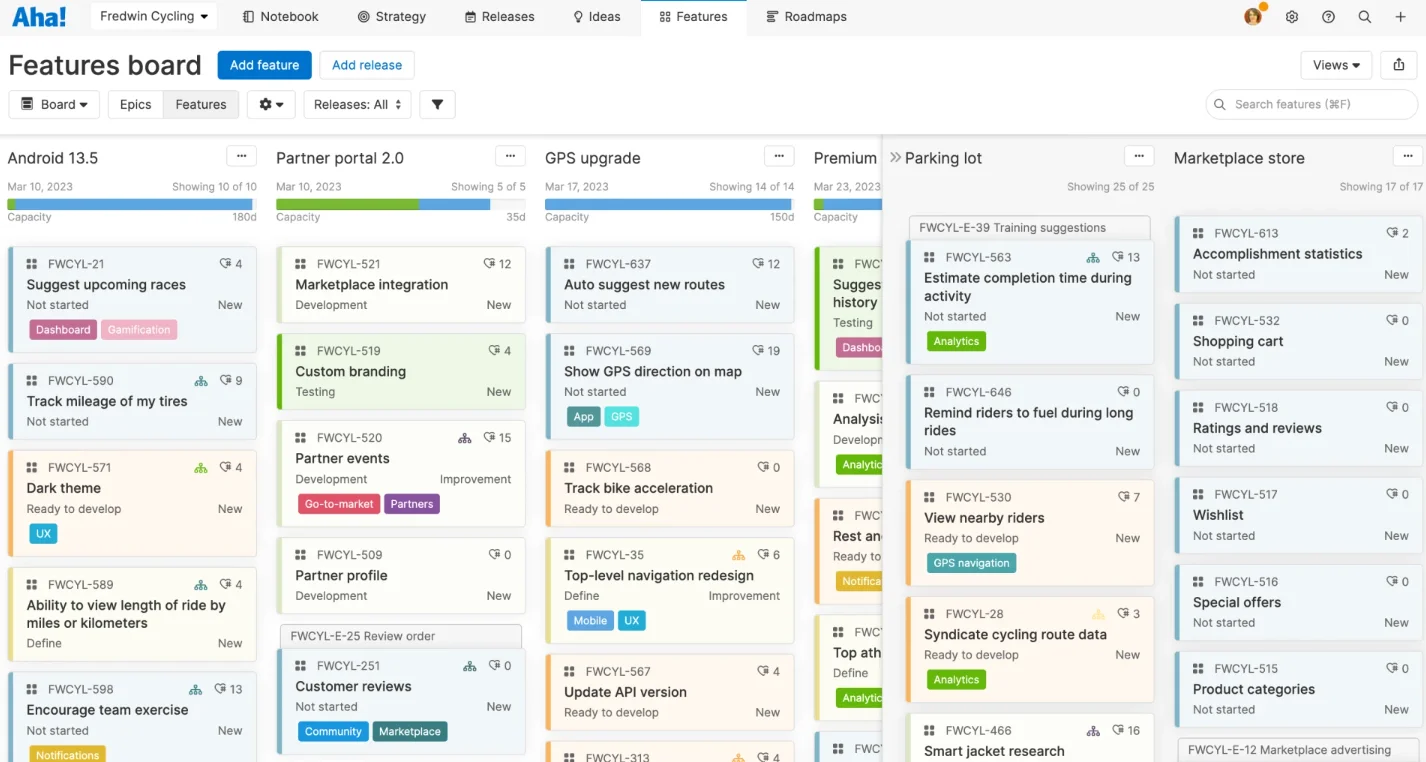
AHA! is a product management software suite that specializes in roadmap creation. You can create strategic business models, delegate tasks, as well as visualize, collaborate, and crowdsource ideas from customers and colleagues.
Key Aha! features include:
- Create a visual roadmap for your product development with Aha! Roadmap
- Use Aha! Roadmaps to create feature cards — directly in releases and by importing from development tools.
- Gather research, analyze trends, and bring them all together with Aha! Ideas
- Centralize all product information and collaborate with stakeholders with Aha! Notebooks
AHA! Pricing: Paid per user per month, depending on your plan; Ideas, Roadmap, or Develop.
32. Digital.ai
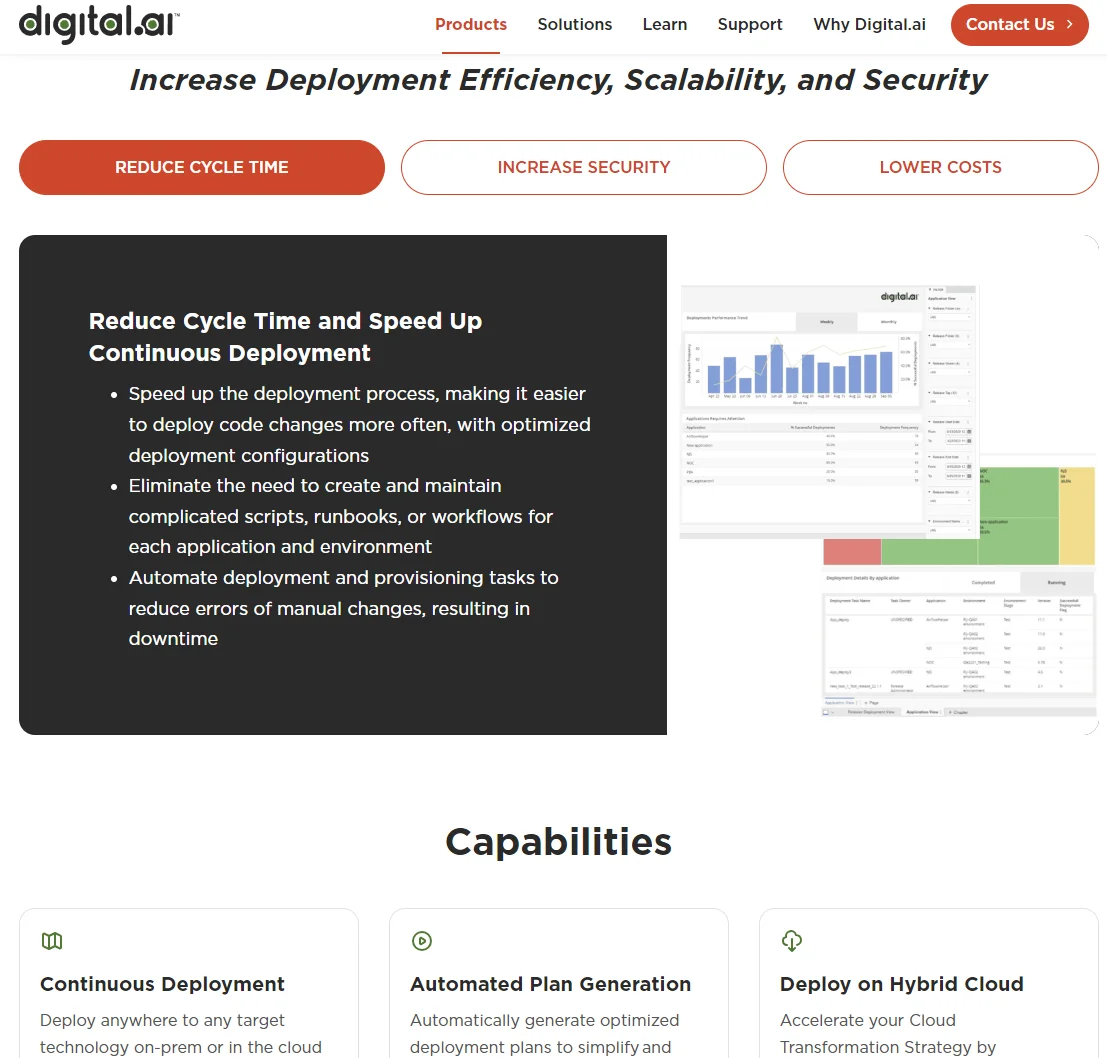
Formerly CollabNet VersionOne, Digital.ai is an “application Agile lifecycle management (ALM) solution”. It supports Kanban, Scrum, SAFe, XP, and hybrid development methods. Digital.ai also eases planning, tracking, and reporting across teams and software portfolios.
Key CollabNet VersionOne features include:
- Portfolio management across environments
- Product road mapping
- Sprint planning for CI/CD teams
- Continuous test management
- Timeline tracking
- Release planning
Digital.ai Pricing: Request pricing. Includes 30-day free trial
33. Trello
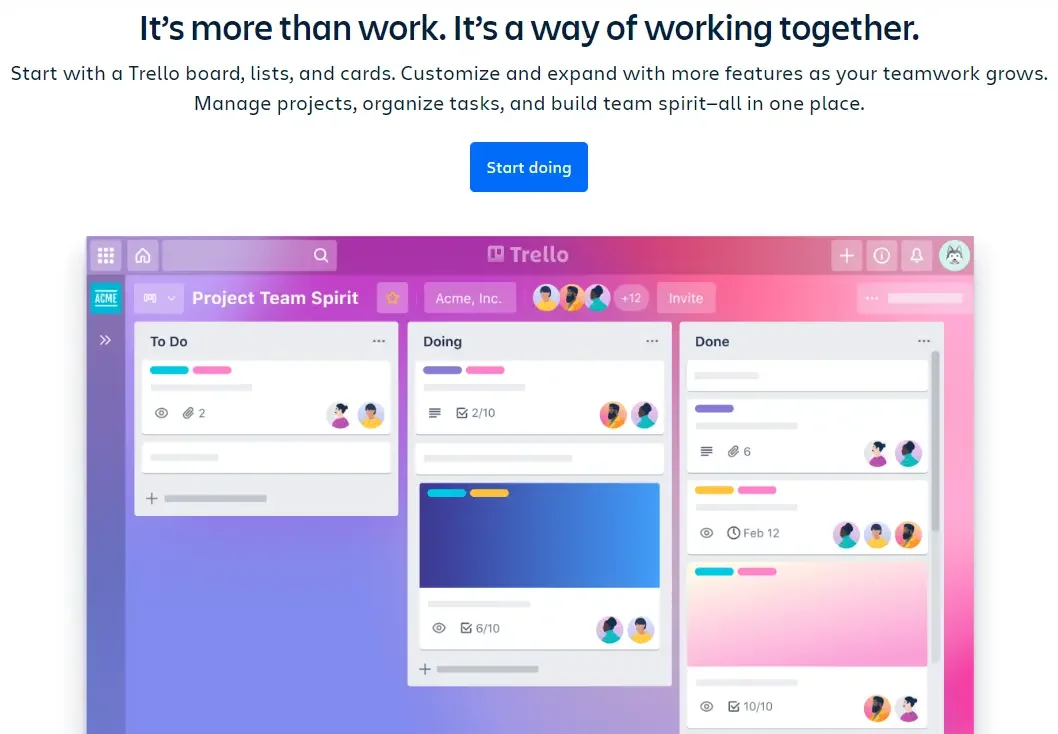
For enterprises seeking less convoluted or feature-heavy software lifecycle management tools, Trello is a great fit. This tool uses a visually appealing, easy-to-use user interface based on cards and boards.
It also uses artificial intelligence to eliminate repetitive tasks and connects with DevOps tools like Slack, Dropbox, Confluence, Google Drive, and Evernote.
Key Trello features include:
- See who is doing what with board, list, and card views
- Assign tasks, track project progress, and collaborate in one place
- Create timelines, use time tracking, and prioritize what you need to do beat your CI/CD deadlines
- Create reports with out-of-the-box or custom productivity metrics to keep everything organized in your language
- Organize your team or project calendars to fit your CI/CD goals
Trello Pricing: Free plan, Standard plan – $6 per user per month for small teams, Premium plan – $12.5 per user per month for larger teams, Enterprise plan – $17.50 per user per month for large teams
Software Build And Configuration Management Tools
The following configuration management (CM) tools automate discovering, documenting, and tracking changes in software, hardware, and devices in your engineering environment.
34. Terraform
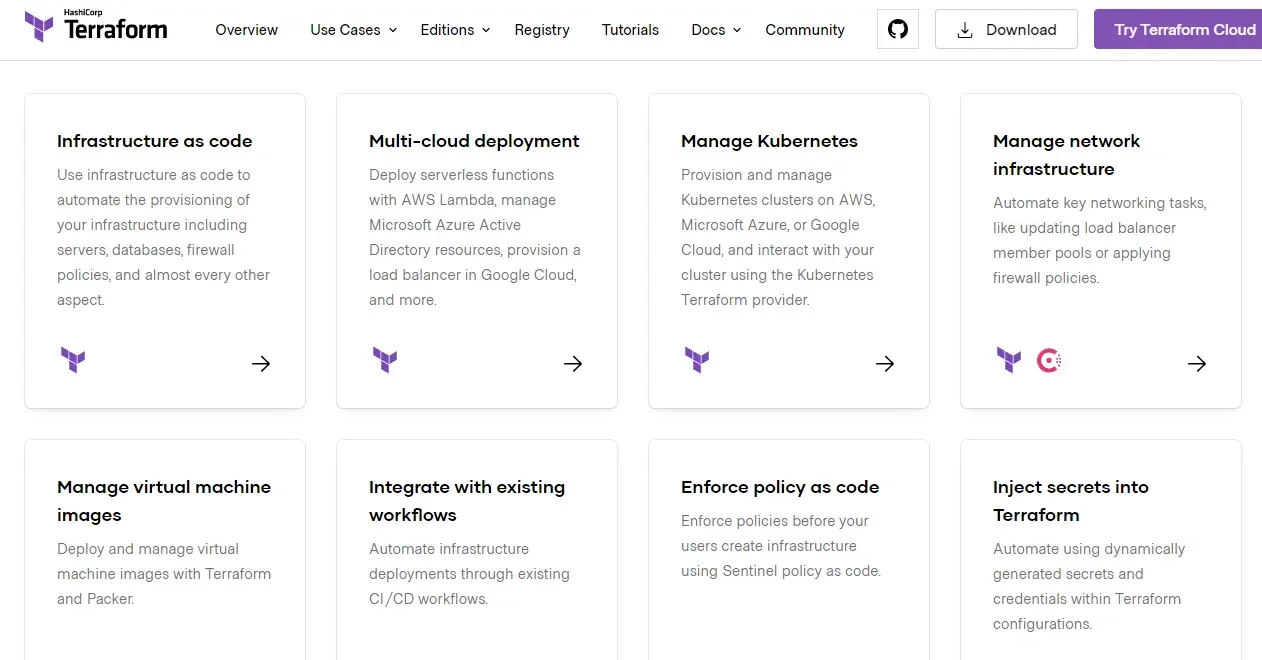
Terraform is an Infrastructure-as-code (IaS) solution. It enables you to configure and define data center infrastructure through HashiCorp’s custom configuration language or JSON. Terraform is compatible with a wide range of Cloud providers, including Azure, VMWare, and AWS.
If you’re subscribed to multiple cloud providers, Terraform is a great way to ensure that they have consistent configurations.
Key Terraform features include:
- Build, modify, and version on-premises and cloud resources efficiently
- Use APIs on cloud platforms and other services to create and manage resources
- Provision and manage resources everywhere; public and private clouds, SaaS applications, and networks.
- Use a three-stage workflow to simplify your work; write, plan, and apply.
Terraform Pricing: Free up to 500 resources per month. Standard plan is $0.00014 per hour per resource. The Plus and Enterprise plans offer custom pricing upon request.
35. CFEngine
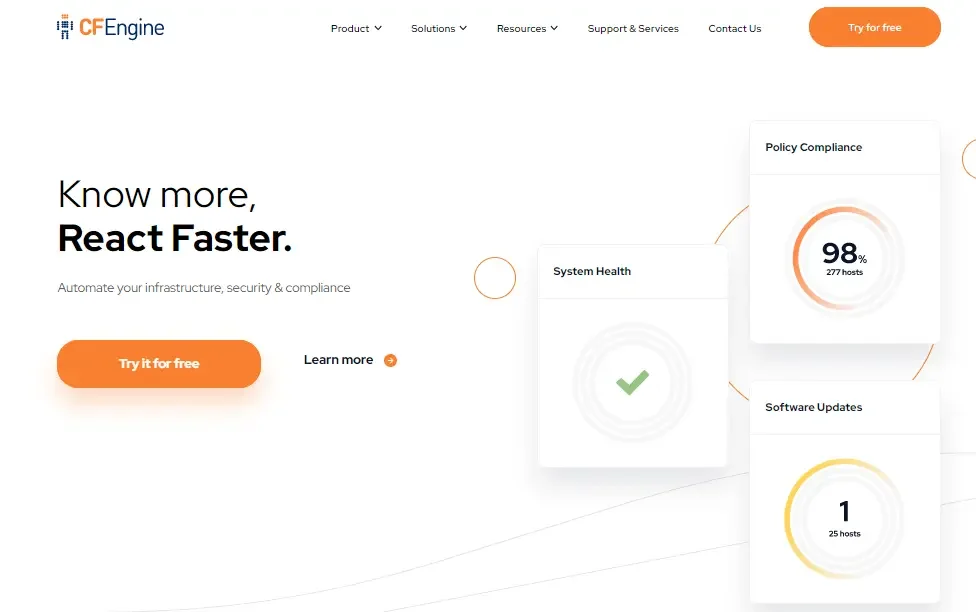
CFEngine is the most cut-and-dry configuration management software on this list. It was originally released in 1993 and has managed to keep up with software development trends. CFEngine features full CI/CD integration.
You can automate infrastructure configurations and manage your patches. It also features compliance reporting and infrastructure hardening.
Key CFEngine features include:
- Decentralized and highly scalable config management tool
- Continuously monitor, self-repair, and recover your entire IT infrastructure
- Get a single dashboard to monitor real-time compliance levels, performance, and more
- Automate security and compliance automation to prevent costly issues
CFEngine Pricing: The Community Edition is Free. Pricing for the Enterprise Edition offers custom pricing.
36. RedHat Ansible
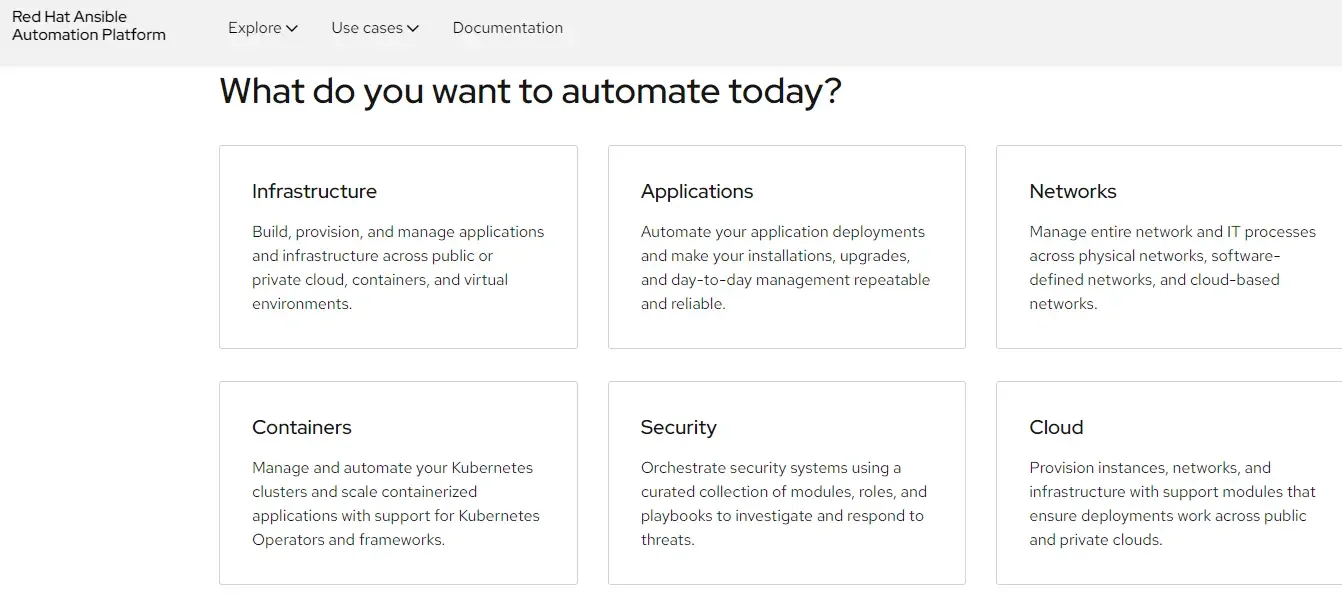
Red Hat’s Ansible is an automation platform used for configuration management as well as continuous deployments. Ansible enables you to keep your configurations consistent across all platforms. Whether your software is hosted on a physical server, cloud, virtual machine, or container, you can alter and manage your configurations from a single point.
Key Ansible features include:
- Open-source, enterprise-level configuration management platform for CI/CD teams
- Provide a streamlined process for booting bare-metal servers or virtual machines and creating cloud instances.
- Use curated roles, modules, and playbooks to investigate and respond to security threats.
- Ensure consistent software deployments and scale infrastructure workloads anywhere (on-premises, edge, network, hybrid cloud, public cloud, private cloud) to meet your performance requirements.
- Orchestrate advanced workflows to deliver software
Ansible Enterprise Pricing: Upon request (Standard or Premium)
37. Rudder
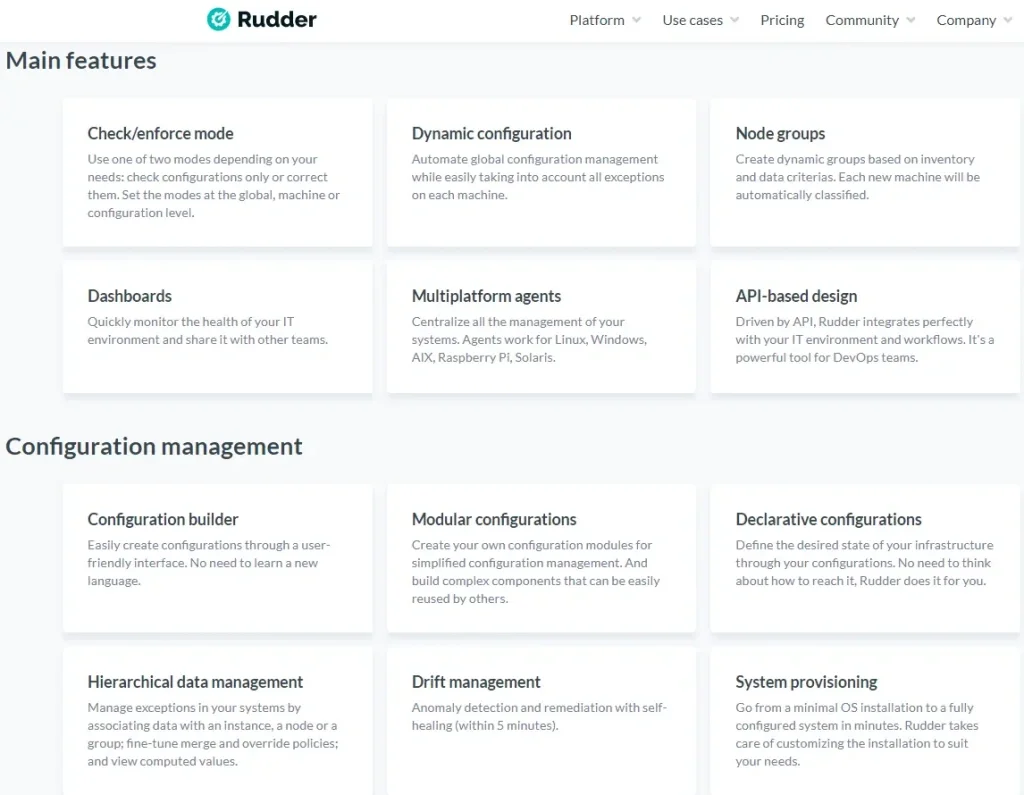
Rudder is an open-source, web-based configuration management tool. It enables continuous audits and enforcement. Rudder comprises a full-featured web-based interface. Since Rudder is open source, the bulk of its core features are free. However, there are additional features such as support that will require a paid subscription.
Key Rudder features include:
- Multi-platform configuration management tool
- Supports standardized, reusable policies
- Includes custom policy editor
- Central reporting
- Grouping is based on search queries and per-host policies
Rudder Pricing: Essential plan costs Euros 50 per node per year. Standard plan is Euros 80 per node per year and the Premium plan is Euros 100 per node per year.
38. RunDeck
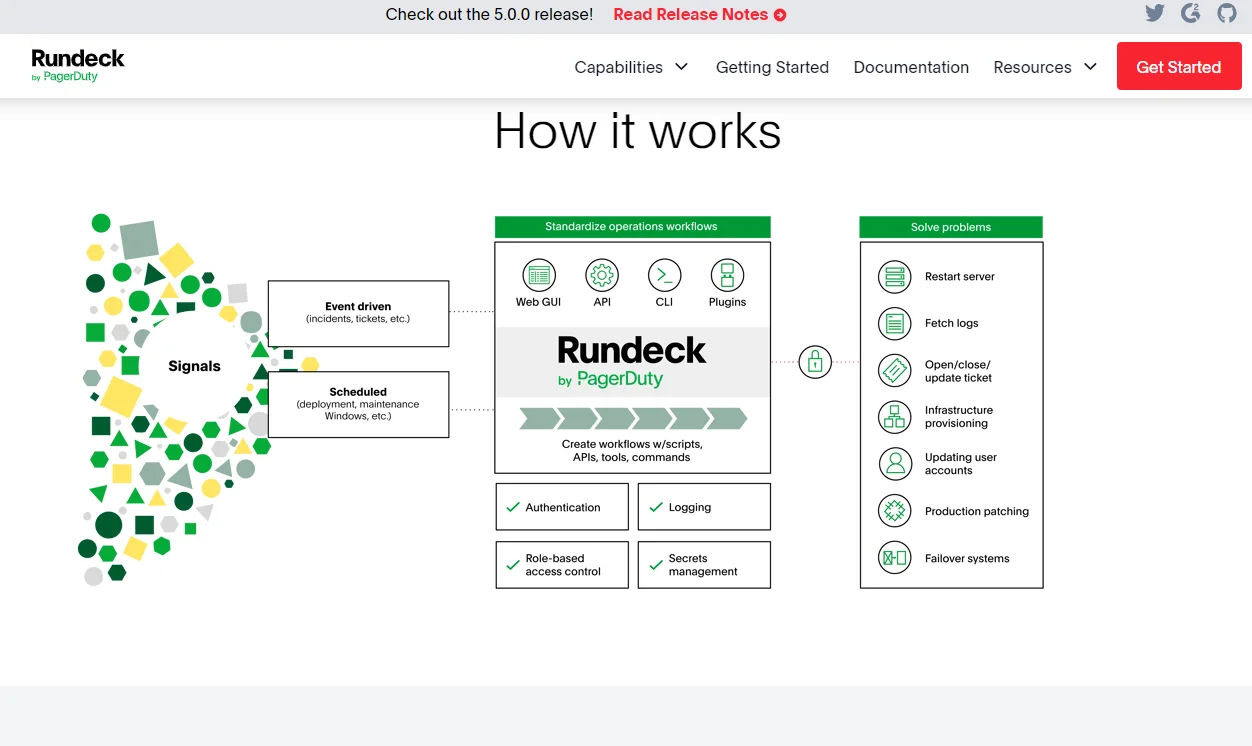
RunDeck is an operations automation platform. It doesn’t just manage deployments but several processes in the CI/CD pipeline as well. It works for old legacy frameworks and new ones. Plus, its built-in governance and control features enable you to delegate a broad range of activities to your teammates.
RunDeck is particularly suited for companies planning to migrate to the cloud.
Key RunDeck features include:
- Runbook automation for small IT teams
- Great for creating standard operating procedures
- Synchronize actions across all your organization’s various scripts, tools, and APIs
- Set self-service automation for job scheduling
- Organize your operations with workflows that span multiple system commands, ensuring more consistent operations
RunDeck Pricing: Community Edition is Free. Enterprise Edition pricing is availed upon request
39. Juju
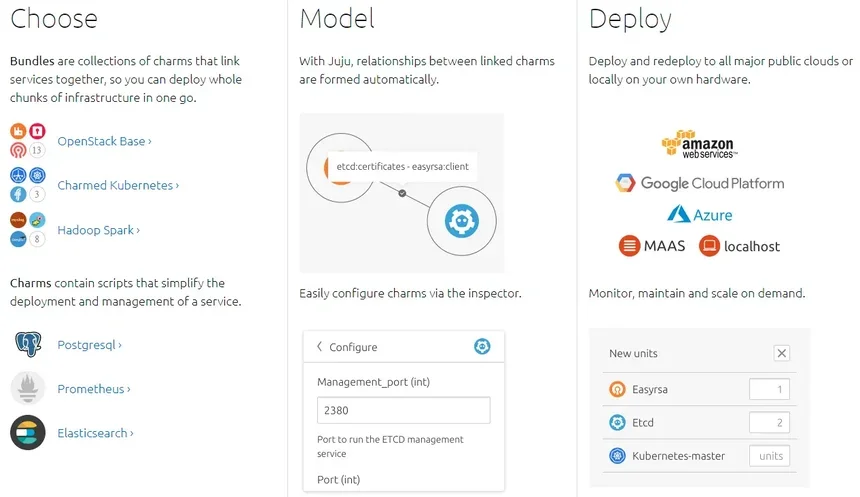
Juju is an application modeling and deployment tool. It allows you to deploy software simultaneously on local servers, containers, and private and public cloud. What makes Juju unique is its approach. CI/CD pipelines for large companies can be complex. Juju uses what it calls “charms” to deploy infrastructure and code.
Key Juju features include:
- Use Juju CLI commands or a dashboard to interact with and manage charmed apps
- Centrally enforce permissions and auditing policies
- View details about your models and controllers, run actions, and configure applications more efficiently
- Works across AWS, Microsoft Azure, Google Cloud, and Oracle
Juju Pricing: Free (Open Source)
40. Apache Maven
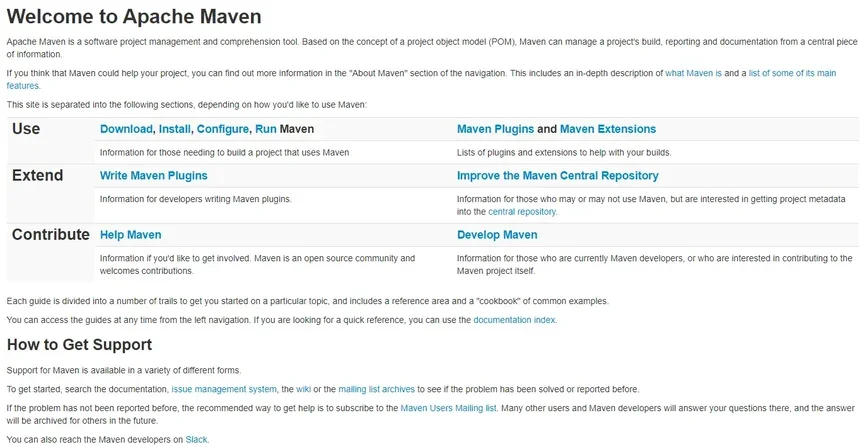
Apache Maven is a software build automation and project management tool. It’s popular among the open-source and Java community. Maven enables you to build and deploy code in Scala, Ruby, Java, C#, Python, etc.
Key Apache Maven features include:
- Open-source tool with simplified project set-up and consistent usage across different projects
- Work with multiple projects at the same time
- Supports transitive dependencies (dependency closures)
- Model-based builds; Build single or multiple projects into pre-defined output types (e.g. WAR, JAR, or distribution based on metadata about the project) largely without scripting
Apache Maven Pricing: Free and Open-source
41. Docker
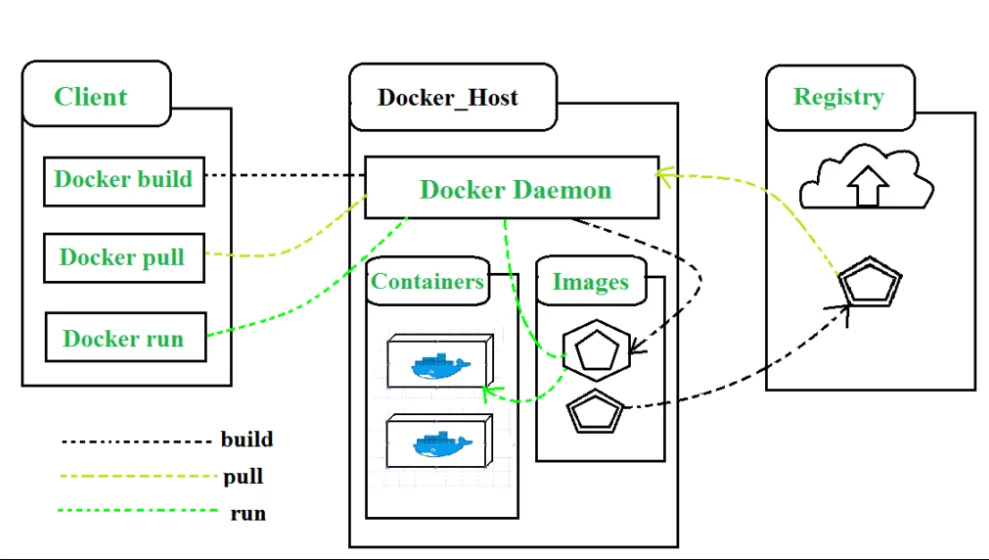
Docker is a virtualization tool that allows enterprises to create cross-platform applications. It achieves this through the power of virtual containers which can be run on Linux, Windows, Mac OS, public, and private cloud. Docker’s SaaS offering is made up of three components — software, objects, and registries.
Within its suite, it offers three core tools — Docker Compose, Docker Swarm, and Docker Volume.
Key Docker features include:
- Build, share, and run apps anywhere without tedious configuration management
- Use Docker images (read-only templates) to containerize applications your way
- Leverage Docker Compose to create multiple containers
- Docker Swarm is a container orchestration platform similar to Kubernetes
- Integrate all your CI/CD tools to deliver software seamlessly (supports CircleCI, VS Code, GitHub, etc.)
- Deploy an application with a single command inside the Docker Compose CLI
Docker Pricing: Free plan up to 200 image pulls per 6 hours, Pro plan – $7/user/month, Team plan – $11/user/month for up 100 users, Business plan – $24/user/month for unlimited users.
42. Apache ANT
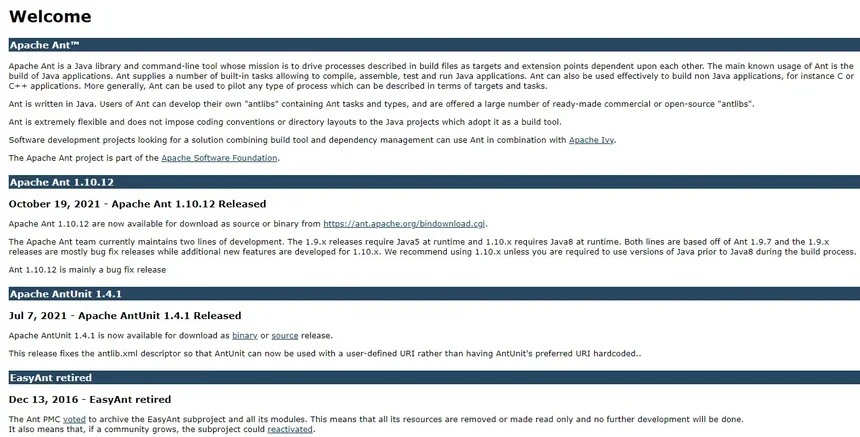
Apache Ant (“Another Neat Tool”) is the oldest tool on this list and can be considered a precursor to Maven. Just like Maven, it was written entirely in Java. ANT uses XML to define the code build process. While ANT is primarily a JAVA build tool, it can be used to define processes and build C++, C, and C# applications.
Key Apache Ant features include:
- Open-source, extensible, and cross-platform
- Compile, test, and run Java applications
- Create Java Doc, .tar, .jar, and .zip files
- Ant is also useful for building C++ and C applications
- Plan and pilot any type of process that’s described with tasks and targets
- As a build tool, it doesn’t impose directory layouts or coding conventions on Java projects
Apache Ant Pricing: Free (Open Source)
43. Packer by HashiCorp
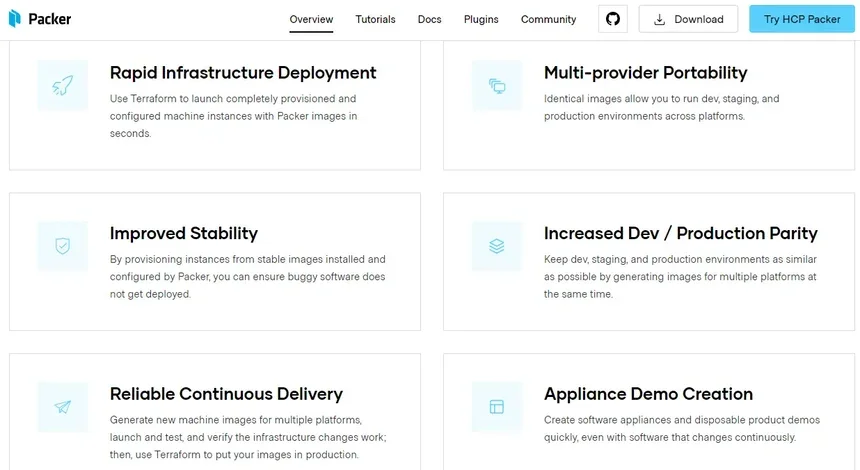
HashiCorp Packer is one of the most well-rounded CI/CD pipeline build tools today. The software automates the creation of multiple machine images. It is also extensible and pluggable, so you can add builders, data sources, post-processors, and provisioners with plugins to add to its capabilities.
Key HashiCorp Packer features include:
- Establishes a consistent, automatic way to automate building your system and container images
- Combine image management with provisioning processes to facilitate auto-updates for downstream builds
- Use a single source file to create parallel images for multiple deployment environments.
- Establish a single workflow for images that span multiple clouds (and private infrastructure).
- Assess your images’ health using Terraform continuous validation.
HashiCorp Packer Pricing: Track 10 image buckets for free (HCP Community Edition). HCP Standard charges $0.010 per hour while HCP Plus is $0.030 per hour
44. Grunt
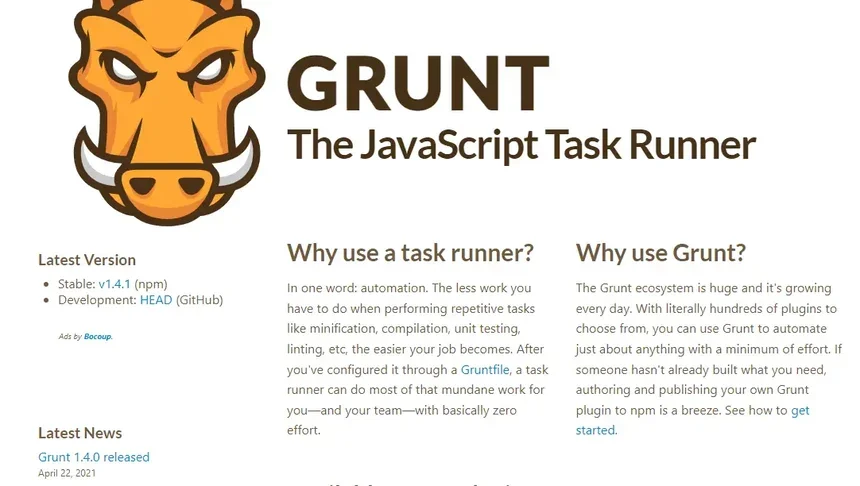
Grunt is a JavaScript task automation tool. You can use it to build, test, and debug your code. You use Gruntfiles to configure tasks. Grunt is also extensible. It has a large library of community-created plugins. Working with Grunt as a novice user can be daunting. Luckily, Grunt has a thriving community and ecosystem that is ready to assist you with any queries.
Key Grunt features include:
- It is a JavaScript Task runner that’s written in Node.js
- Use a Gruntfile to automate tasks and processes such as unit testing, minification, compilation, and linting
- For example, it minifies JavaScript, testing files, CSS files
- It also compiles CSS preprocessor files (LESS, SASS), and more.
- Choose from over 4,000 supported plugins to automate even more tasks
Grunt Pricing: Free and Open-source
Cloud/IaaS Tools
If you’re not directly deploying your software onto your clients’ machines or giving them direct access to a server, you’re going to need a service to host it. You may have the best building tools and deployment software, but it doesn’t mean much if you don’t have the infrastructure or resources to get it to the final consumer.
Here is a list of solutions you can consider.
45. Amazon Web Services (AWS)

Amazon Web Services need no introduction. In 2023, AWS had a 33% share of the cloud services market, according to Synergy Research Group. You can build virtual servers with Amazon EC2, relational databases with Amazon Aurora and Amazon RDS, isolated cloud resources with Amazon VPC, and machine models with Amazon SageMaker. It also features a litany of analytics and app integration tools.
Key AWS features include:
- Offers over 240 cloud services and products that cover most aspects of cloud computing, from compute to storage and AI/ML/analytics to databases.
- Pay-as-you-go pricing for most services ensures you pay for only what you use
- Over 143 cloud security standards and compliance certifications built-in or integrated
- No matter where your distributed CI/CD team members are located, its extensive network of global data centers ensures minimal latency
- Seamlessly compatible with most tools, services, and CI/CD workflows
AWS Pricing: Pay-as-you-go (For detailed pricing, visit the AWS pricing guide). For a comparison of the best cloud service provider, check this AWS vs Azure vs Google Cloud Platform guide.
46. Morpheus
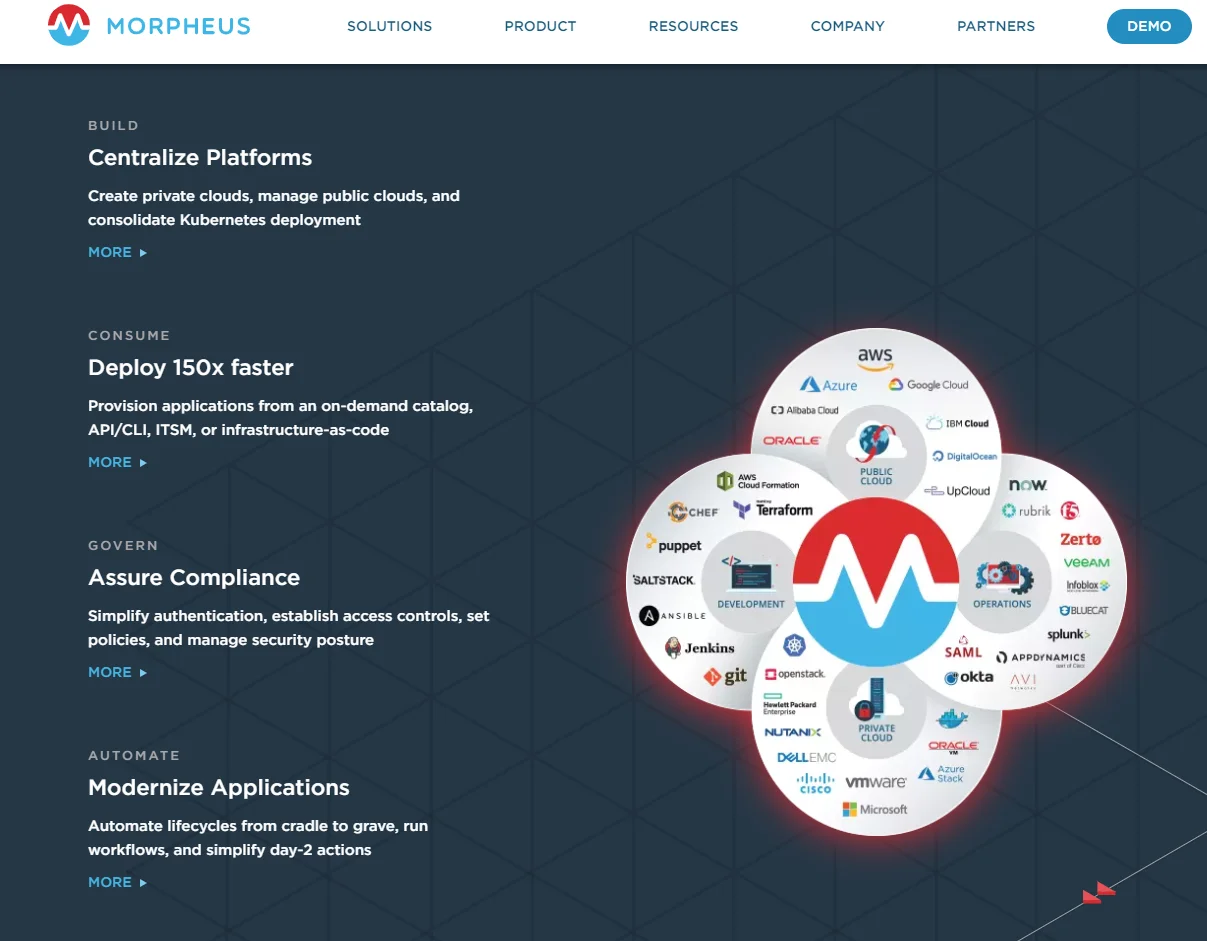
Morpheus is a cloud management platform with a focus on cloud migration. It’s a self-service platform for hybrid cloud application orchestration. Morpheus empowers you to set up a private cloud and control public cloud access to team provisions on demand.
It’s persona-based so IT, security, and finance teams all get what they need to spend less time worrying about infrastructure and more time modernizing applications. It affords you the freedom to mix and match on-premise and public cloud technologies.
Key Morpheus features include:
- Automate the provisioning phase of CI/CD
- Asynchronously provision apps, databases, and app stack components on any server or cloud. Multiple IT systems are provisioned simultaneously
- Integrates with source-code management platforms such as Git to trigger provisioning updates
- Applied updates and manages golden image templates by integrating with platforms such as Ansible
- Ensures workflows and provisioning are consistent across environments (private or public cloud) and minimizes disruption in the event of platform changes
Morpheus Pricing: Upon request
47. OpenStack
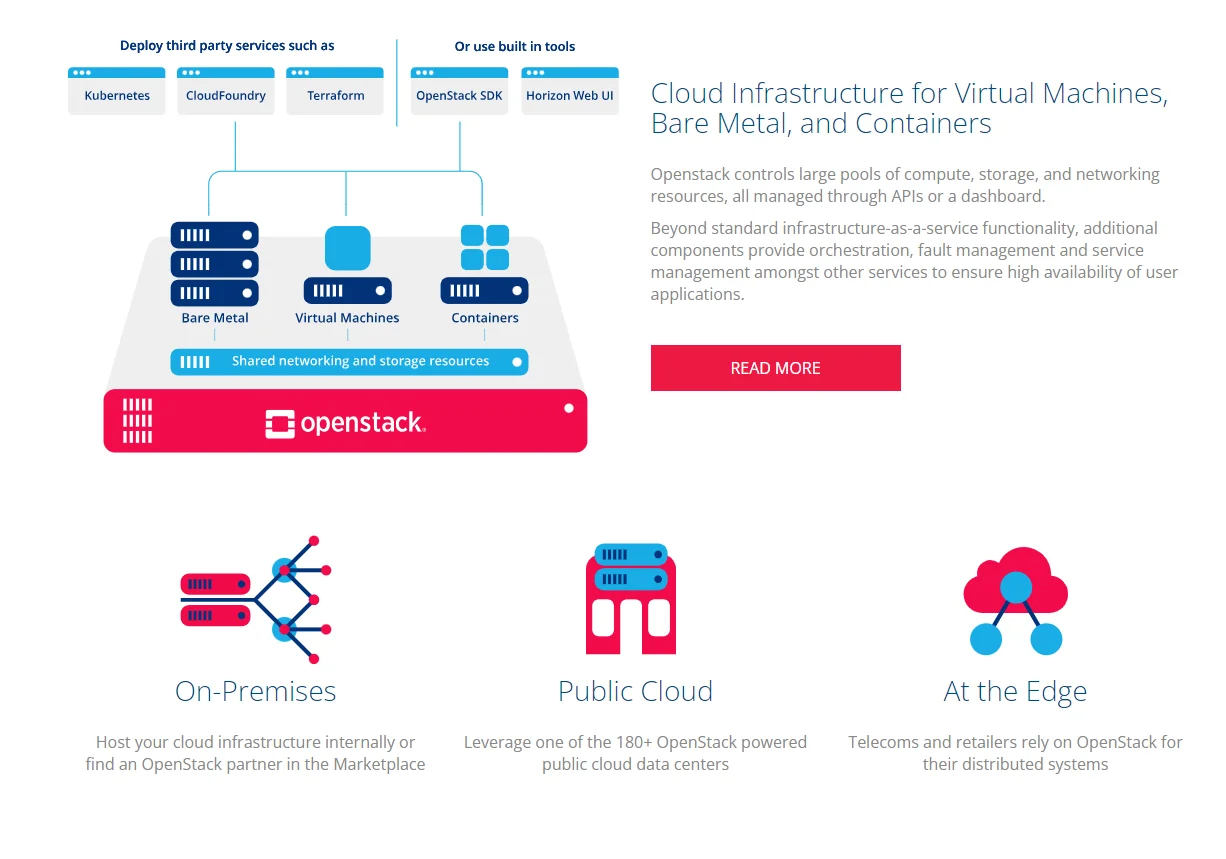
OpenStack is a cloud framework. It provides horizontal scaling infrastructure for users and enterprises. Additionally, OpenStack helps with data storage, compute, and resource sharing. It also provides self-service administration that users can interact with directly. OpenStack is open-source, which makes it highly adaptable. This also saves you from possible vendor lock-in.
Key OpenStack features include:
- Open-source IaaS tool for teams
- Deploy VMs on demand for various projects
- Enables different cloud services to interact
- Program VMs to handle tasks such as processing and identification
- Perform provisioning within the network
OpenStack Pricing: Free for private cloud (Open Source), Public cloud is enterprise size-dependent (visit the price guide for more details)
48. Google Cloud Platform (GCP)
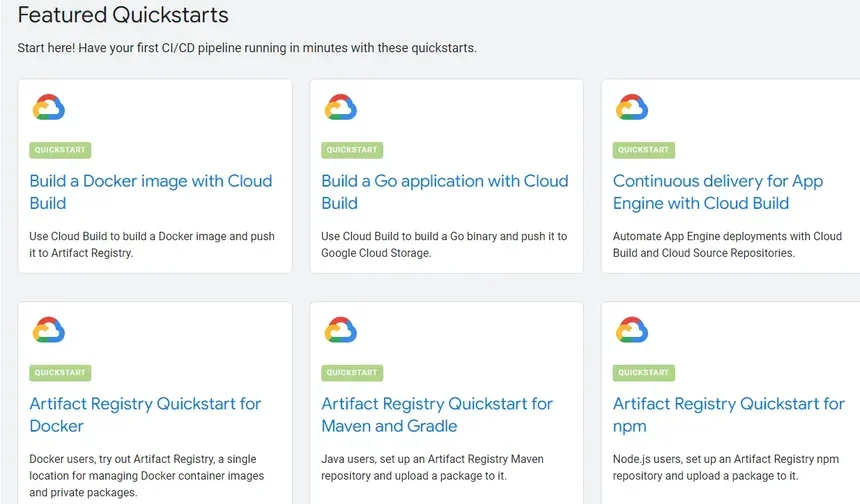
Like AWS, Google Cloud Platform (GCP) is a cloud service provider. It offers more than 100 cloud products and services under one roof. It also offers several tools for CI/CD teams, such as Cloud Build, Cloud Deploy, and Cloud Code. Each CI/CD tool has its best use case.
Key Google Cloud Platform CI/CD tools:
- Cloud Build is a fully managed CI/CD platform that executes builds sequentially. It is capable of importing source code from Cloud Source Repositories, Google Cloud Storage, BitBucket, and GitHub
- Integrating Cloud Code into an IDE simplifies writes, runs, and debugs for cloud-native apps. You then push the code to Cloud Build (build), Artifact Registry (packaging), and GKE or Cloud Run for running
- Cloud Deploy provides a managed, opinionated CD service to speed up deliveries to Google Kubernetes Engine (GKE)
- Operations suite provides a tool to visualize your deployment metrics
GCP Pricing: Pay-as-you-go pricing (only pay for what you use). Visit Google Cloud pricing guide here for the latest prices. Or, check out our AWS vs GCP pricing guide here for a no-BS breakdown.
49. Dokku
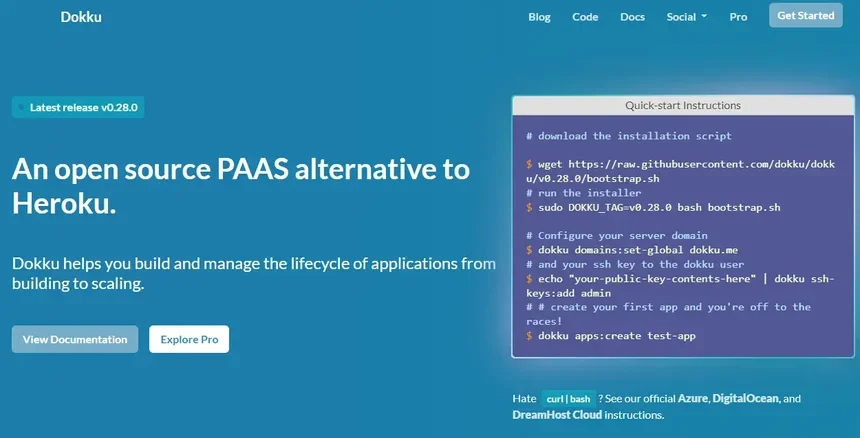
Dokku is a great alternative to Heroku if you’re working with a stringent budget. It’s a miniaturized self-hosted platform as a service. You can deploy applications to it using Git. It’s easy to set up and has a wide variety of plugins that work out of the box. These plugins include Mongo, Postgres, and Redis.
Key Dokku features include:
- It’s a Heroku derivative and thus compatible with Heroku apps
- If the available plugins don’t cut it, create your own custom plugins in any language
- Powered by Docker
- Designed to run on a single server of your choosing
Dokku Pricing: Free and Open-source
Kubernetes CI/CD Tools
CI/CD tools for Kubernetes automate deployment and application management. The tools use a declarative approach, where the desired application state is stored in configuration files (often in version control). This approach enables consistent, reliable deployments across environments.
50. Argo CD
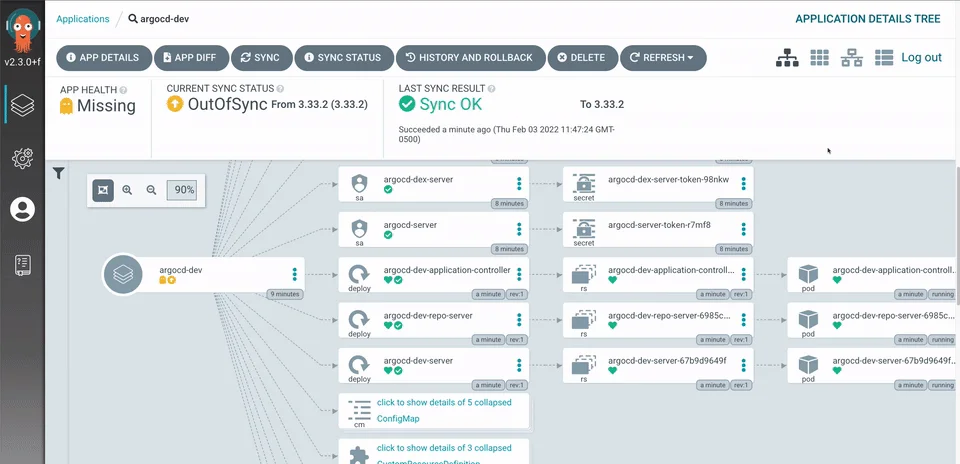
Source: Linked in
Argo CD is a Kubernetes-native GitOps tool that syncs the desired application state from Git to the cluster. This ensures each deployment is auditable and aligned with Git for smoother management.
Argo CD key features include:
- Deploys applications to specified target environments automatically
- Integrates with GitHub, BitBucket, and GitLab for webhook-based triggers
- Supports multiple config management tools such as Kustomize, Helm, Jsonnet, and plain YAML
- Provides role-based access control for authorization
- Analyzes the health status of application resources
- Detects and visualizes configuration drift between the desired and actual states
- Provides audit trails for application events and API calls, along with Prometheus metrics
Argo CD pricing: Open-source (free), Starter – $29/month, Pro – $295/month, Pro Plus – $495/month, Enterprise – Custom pricing (via Akuity).
51. Flux CD
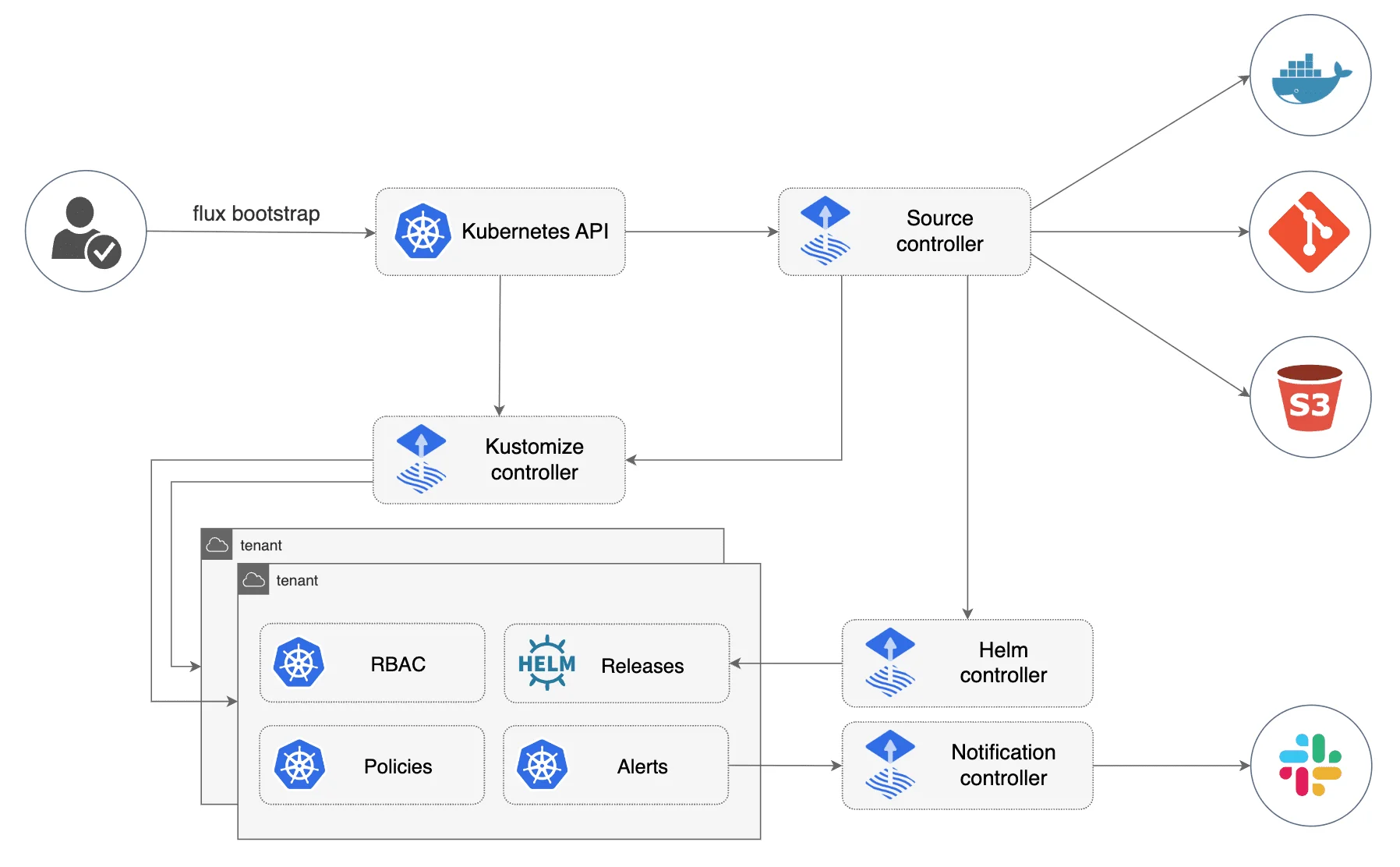
Flux CD is an open-source platform that follows GitOps principles for Kubernetes deployments. It monitors Git for configuration changes and applies them to keep clusters current.
Flux CD also integrates with Kubernetes to simplify updates, rollbacks, and version control.
Flux CD key features include:
- Promotes consistency with declarative files
- Uses Git for traceable configuration management
- Supports shared environments for multiple teams
- Enables safe, gradual rollouts
- Works with Kustomize and Helm for flexible deployments
- Supports pull-based model limits permission needs in the cluster
Flux CD pricing: Open-source (free). For enterprise-grade features and support, ControlPlane offers subscription plans: CPE-1 Bundle – $1,250/month, CPE-10 Bundle – $6,250/month, CPE-25 Bundle – $10,500/month, CPE-100 Bundle – $42,000/month (via ControlPlane).
DevOps Testing Software
The following tools enable CI/CD teams to perform continuous testing more efficiently.
52. WebApp.io
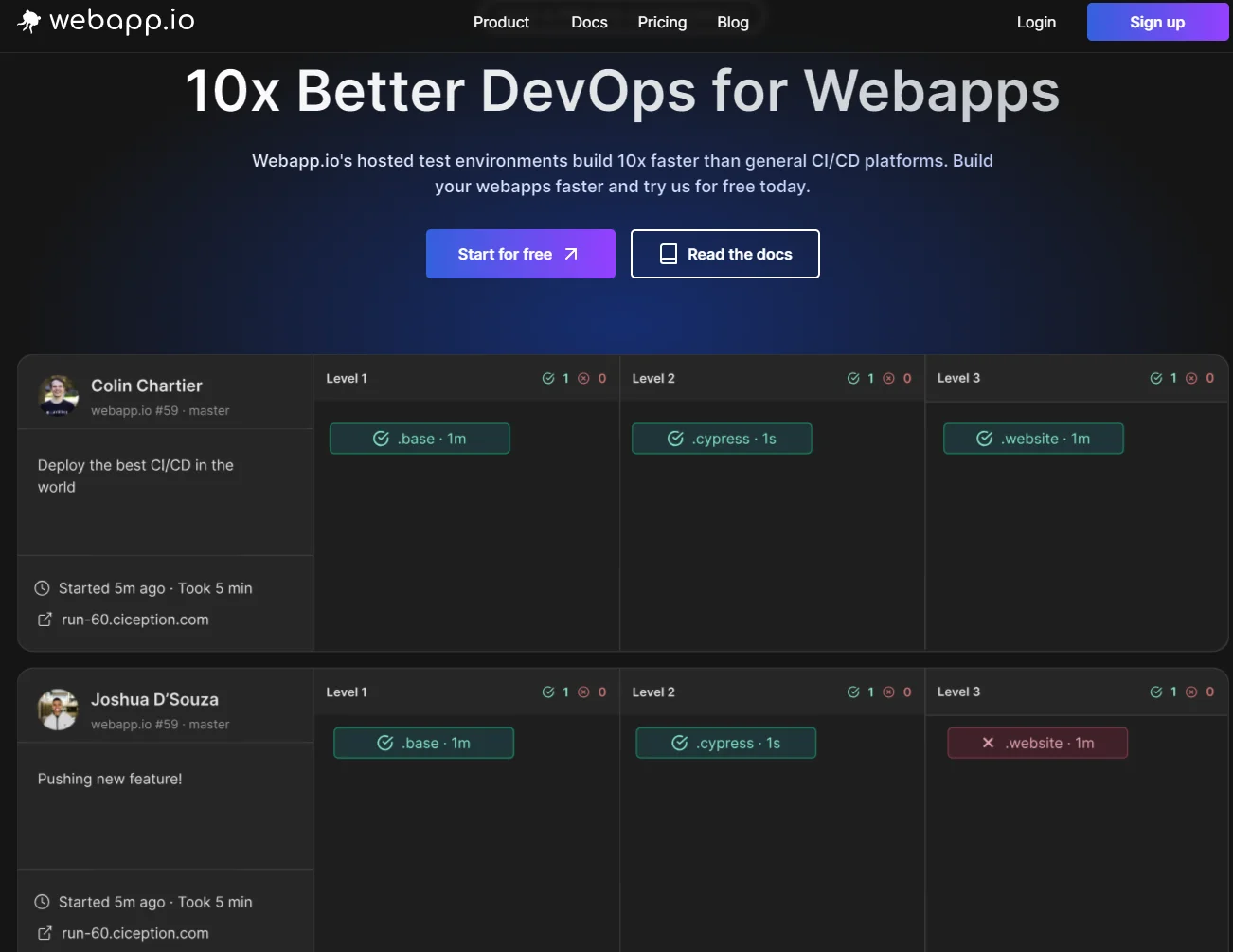
Formerly LayerCI, WebApp is one of the newest products on this list. It was founded in 2018 and is geared towards full-stack development testing. What makes it somewhat unique is how it uses memory snapshotting technology for fast and efficient testing. But it offers more.
Key WebApp.io features include:
- LayerCI will create automated demo environments to help you quickly review your changes and weed out any bugs.
- LayerCI supports GitHub, GitLab, and Bitbucket repositories.
- Spins up new virtual machines in seconds each time you push your code to BitBucket, GitLab or GitHub
- Automatically hibernates VMs when not in use to minimize resource wastage
- Copy your stack onto multiple VMs and conduct parallel acceptance tests
WebApp Pricing: Free for up to 3 members, Starter plan – $15 per member per month for up to 10 members, Team plan – $39 per member per month, Enterprise plan – Custom pricing.
53. Katalon
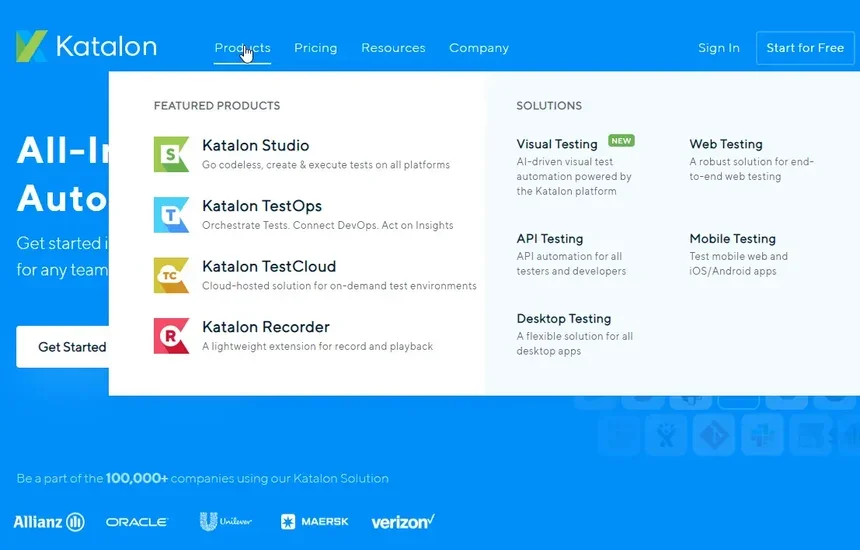
This testing automation platform delivers consistent, continuous, and scalable testing in one platform. Katalon generates and executes tests on virtually any operating system, browser, and device. It also works on both cloud and on-premise deployments. Katalon also integrates with Jira out-of-the-box and includes native integration with top CI tools like CircleCI, Bamboo, Jenkins, and Azure Pipelines.
Key Katalon features include:
- AI-powered test automation platform
- Easy to record and playback real-world scenarios
- Automatically capture test objects, locators and properties with Katalon Studio
- On-demand environments let you run tests in parallel across OS, devices, and browsers
- Runtime Engine facilitates execution in your own environment using smart wait, scheduling, self-healing, and parallel execution
- Ensure real-world usage-based regression testing by monitoring user journeys in web applications
Katalon Pricing: Free – Web, API, mobile, and desktop testing; the Premium plan is $208 per month for Katalan Studio Enterprise; the Enterprise plan offers custom pricing for enterprise-grade test automation with extended support.
Understand, Control, And Optimize Your CI/CD Costs The Smarter Way
A successful CI/CD strategy requires the right resources and tools. Yet, keeping track of everything, including data transfer costs, can be challenging. And it may be difficult to optimize your cloud spend if you don’t know what drives it.
To understand what drives your cloud costs, you need a platform like CloudZero. Consider this:
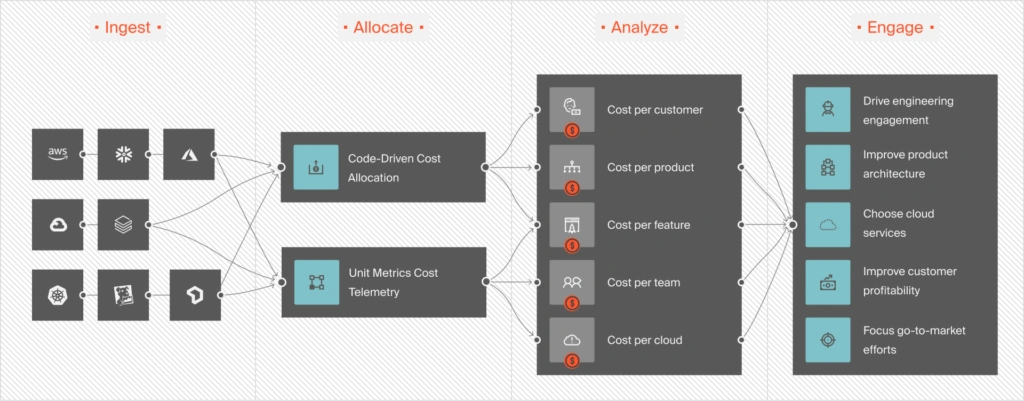
With CloudZero’s unit cost approach, your engineering team can see how their technical choices affect your bottomline. Plus CloudZero provides cost insights in their own language, such as Cost per Deployment, per Environment, per Service, per Feature, per Dev Team, etc.
We call it Engineering-Led Optimization (ELO). Having such granular cost visibility ensures you can build cost-effective solutions without accruing tech debt, struggling with budget overruns, and eating into your margins.
Additionally, CloudZero uses real-time cost anomaly detection. This ensures you get timely, noise-free, and context-rich alerts via Slack and email to prevent overspending.
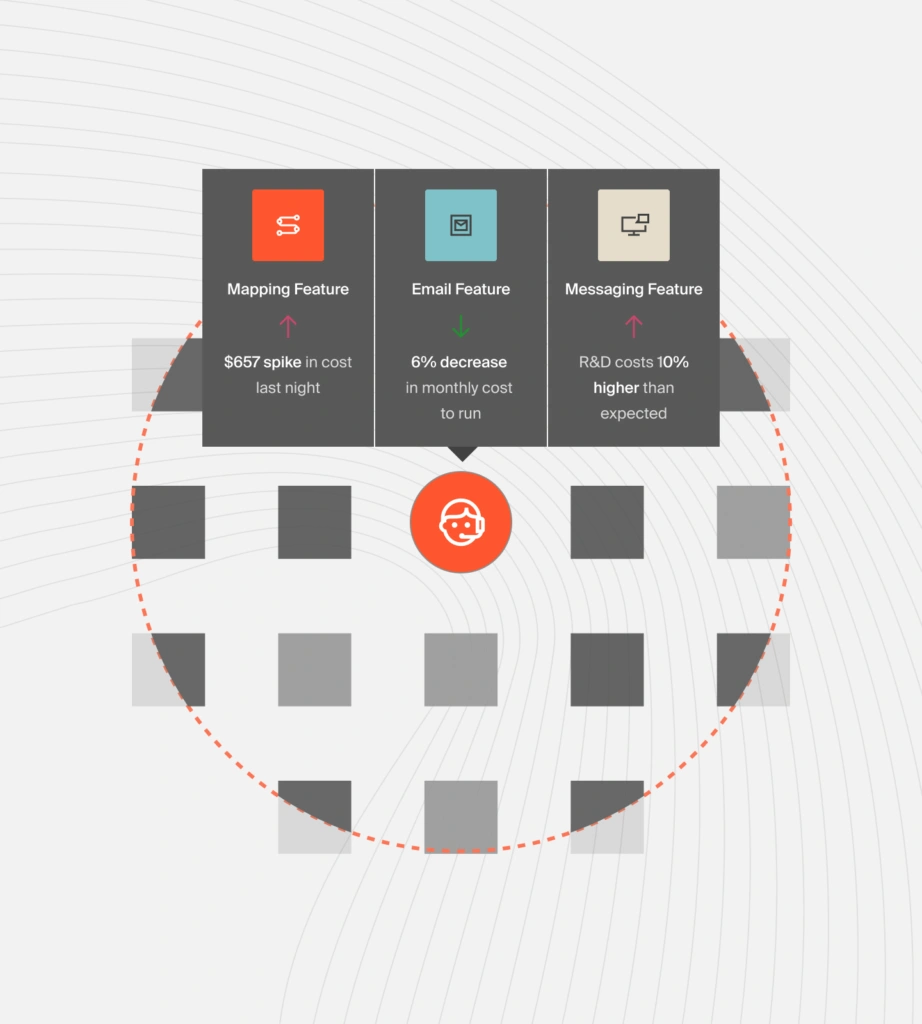
Whether you are a large enterprise or a bubbling startup, CloudZero works at any scale, too.
With CloudZero, Drift has saved over $3 million in AWS costs. Recently, Neon has increased cost ownership by 700%. You want similar or better?  to see CloudZero in action firsthand.
to see CloudZero in action firsthand.
